FOCUS
for students | faculty | alumni | staff | trustees | and friends of fielding
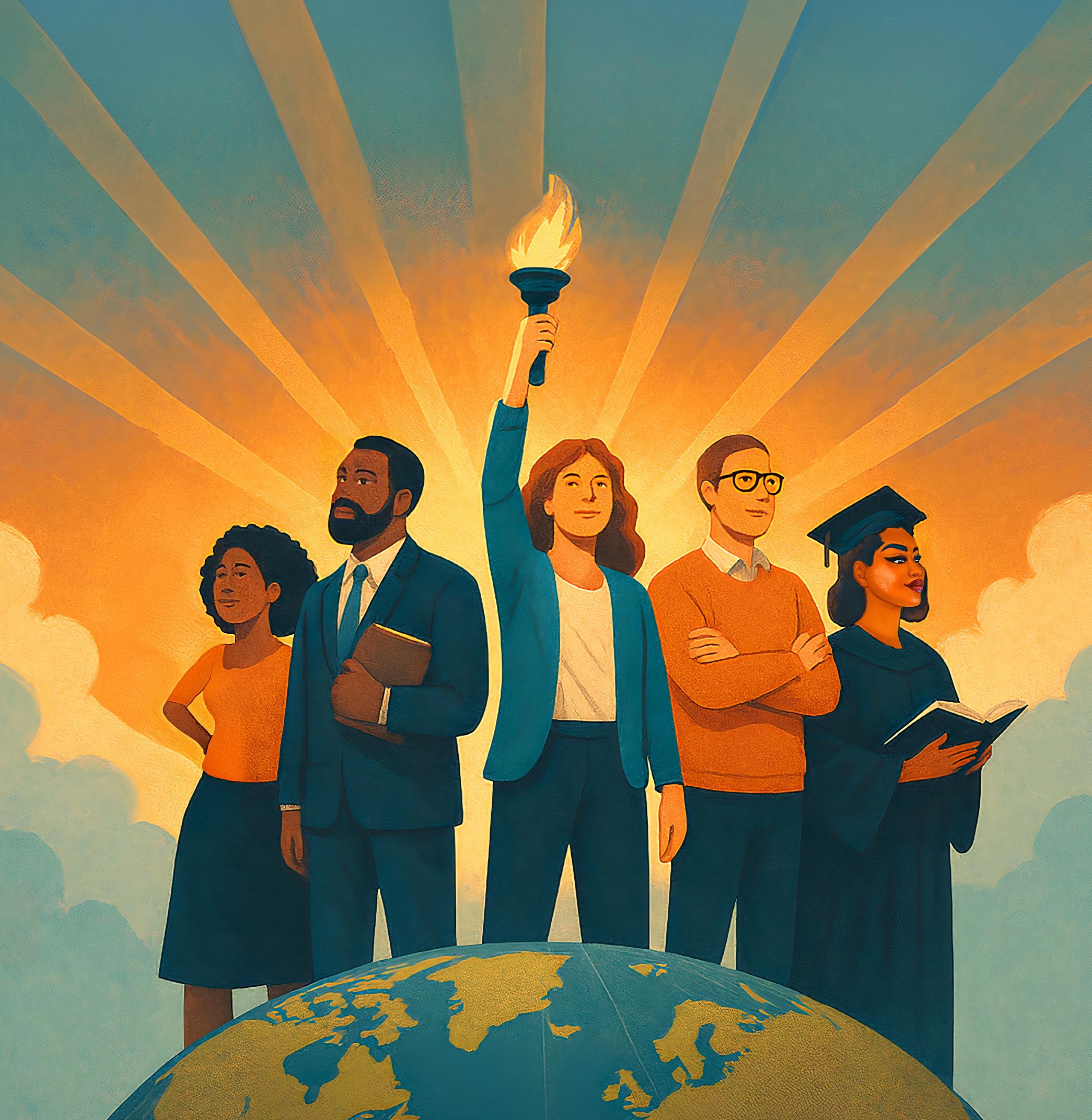


President
John L Bennett, PhD
Managing Editor
Catherine Ryan
Editor
Marie Sonnet, PhD
Proofreader
Bianca Copeland
Data Editors
Bridget L. Brady
Mila Kon
Marlen Bautista
Art Director
Rob Grayson, Boone Graphics
Graphic Design
Studio B at Boone Graphics
FOCUS is published by Fielding Graduate University
2020 De la Vina Street
Santa Barbara, CA 93105
Please send reader responses to communications@fielding.edu
About the Cover: The Changemakers issue of Focus highlights Fielding Graduate University’s enduring mission to develop scholar-practitioners who lead transformative change. In a world facing environmental, social, political, and technological upheaval, this edition recognizes the collective changemaking ethos that defines Fielding, affirming that purposeful leadership, rooted in knowledge and equity, can and does change the world.
© 2025 Fielding Graduate University. All rights reserved. No portion of this publication may be reproduced in any form without prior written permission from Fielding Graduate University.


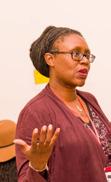

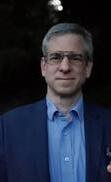
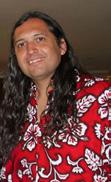
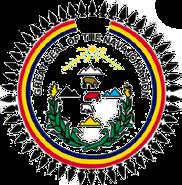
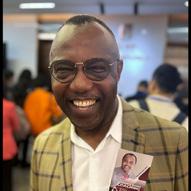


















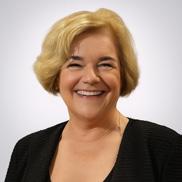
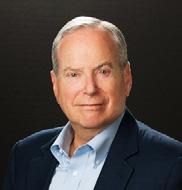










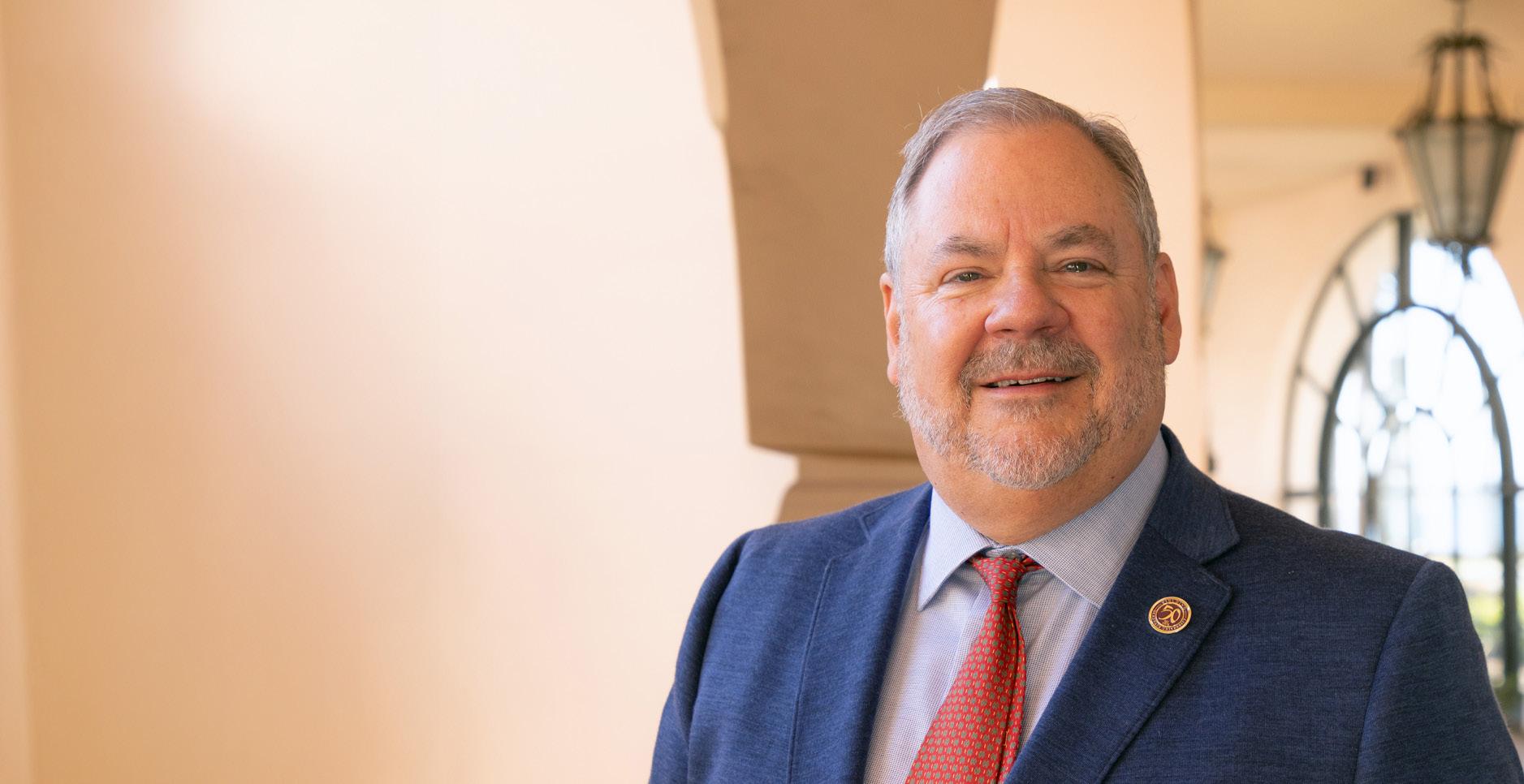
Dear Fielding Community,
It is a deep honor to write to you for the first time as the new president of Fielding Graduate University. As a Fielding alum (HOD ’06) and former member of the Board of Trustees, I step into this role with profound respect for Fielding’s legacy, its unwavering commitment to adult education, and the transformative vision that has guided our work for more than 50 years. As our world navigates a time of extraordinary change — socially, politically, environmentally, and technologically — our work here at Fielding has never been more important, or more inspiring.
This issue of FOCUS, themed Chagemakers — Leading with Purpose, arrives at a moment of reflection and momentum. Around the globe, people are asking: How do we lead in a world that feels increasingly uncertain? How can we contribute meaningfully in the face of complex and overlapping crises? At Fielding, we believe the answer lies in nurturing leaders who combine rigorous scholarship with ethical action — individuals who are prepared to respond to change and to help shape it. Fielding’s commitment to changemaking lives in every corner of our university. It’s present in the research, learning, and advocacy happening across the School of Leadership Studies, the School of Psychology, the Institute for Social Innovation, The Marie Fielder Center for Democracy, Leadership, and Education, and The Alonso Center for Psychodynamic Studies. Our students — your fellow alumni, colleagues, and future leaders — are not waiting for the world to improve on its own. They are studying, questioning, innovating, and building the tools they need to create a more just and sustainable future.
In this issue, you’ll meet Fielding students, graduates, and faculty, who are leading with courage and clarity in diverse fields — from mental health to organizational change, from social innovation to educational equity. These changemakers remind us that leadership is about service, empathy, and the willingness to face complexity with both critical thinking and compassion. Their work is a reflection of Fielding’s values and a powerful invitation to us all: Listen more deeply, act more boldly, and lead with purpose. Likewise, our students are all changemakers, too, preparing now to make even greater positive impacts. They are mothers, caregivers, veterans, activists, and professionals, each bringing lived experience and unshakable dedication to their studies — preparing to advance equity in public health, champion trauma-informed psychology, redefine leadership in business and education, and empower communities through innovation and advocacy. We’re proud to highlight our extraordinary human beings, and the vision they bring for the future.
To our students, I say this: The work you are doing matters tremendously. The road ahead needs your insight, your integrity, and your bold ideas. You are not alone on this journey. You are a vital part of the Fielding family — a community that believes in your purpose and stands ready to help you rise.
With commitment and gratitude,
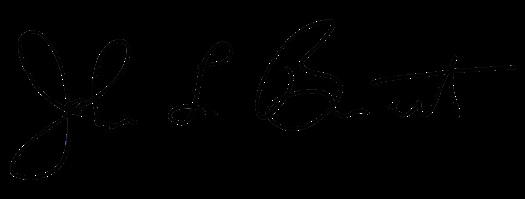
John L. Bennett, PhD President
BY CATHERINE RYAN
In Palm Springs, where the desert light stretches long across terracotta rooftops and bougainvillea flares against white stucco, William “Bill” Huffaker, PhD, is thinking — again — about change, the messy, structural kind that reshapes how people live and labor.
Newly appointed as a trustee of Fielding Graduate University, Huffaker already knows the institution well. He earned his PhD in Human and Organizational Development from Fielding in 2009. His dissertation explored the spiritual development of midlife gay men, indicative of his deep commitment to personal growth and social insight.
By day, Huffaker is the Senior Vice President of Global Talent at Newell Brands, a multinational with a portfolio of householdname products like Sharpie and Rubbermaid. But underneath the performance metrics and strategic frameworks, he’s a changemaker shaped by Fielding’s ethos — someone who sees talent development and organizational design not just as structures to manage, but as living systems to transform.
Right now, he’s leading a sweeping initiative at Newell Brands focused on the future of work — reimagining how we collaborate with AI, reskill the workforce, and create a fully digital, empowered employment experience. “The very notion of work, the workplace, and the workforce is evolving at an exponential rate,” Huffaker notes, adding, “We have to be bolder and control our destiny or it will be controlled for us.”
He’s referring to the kind of mindset evolution that makes a person not just more skilled, but more expansive — better able to navigate complexity, contradiction, and change. The old industrial-age model of leadership, he argues, simply won’t survive in an AI-augmented, hybrid, fast-moving world. For the past two decades, Huffaker has been steadily reengineering it from within.
Huffaker’s resume reads like a tour of the Fortune 100: Google, Microsoft, General Motors, Visa, Workday. But beneath each corporate title is a consistent mission to transform how organizations cultivate talent, especially in moments of transition.
Curiosity is his personal engine. A lifelong learner, Huffaker is in his third year of Spanish lessons and studying for certification as a public board director. He teaches part-time. He gives time and money to causes he values, including Fielding. He’s visited 38 countries, donated a kidney to a friend, and reads voraciously. “I don’t think I’ll ever be done learning,” he says, smiling.
It was at Fielding, Huffaker says, that he first found a home for this deeper intellectual and ethical sensibility. “At Fielding, I experienced the transformational power of learning. Yes, I honed skills in critical thinking and writing, but more importantly,
I learned lifelong lessons in resilience, empathy, and the power of community.”
Huffaker’s experience as a first-generation master’s and doctoral graduate, a gay man in corporate America, and a seeker of deeper truths all converge in his belief that leadership is a moral act. “We are all in this together, and it’s an exciting time to be in the field,” he says, adding, “We need people like those from the Fielding community who have humanistic ideals to usher in and shape the future of work in this new era. We need more ‘vertical’ mindset development. Our potential will now only be limited by our own imagination and sense of curiosity.”
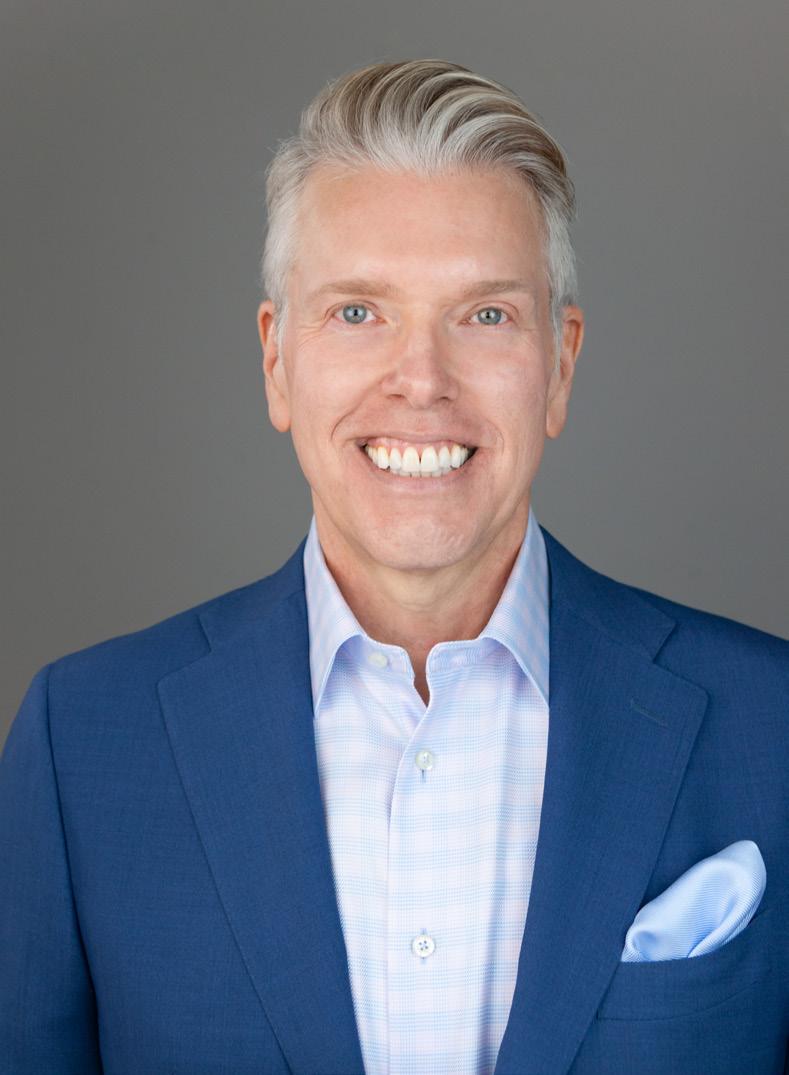
As Fielding itself navigates the evolving terrain of higher education, Huffaker is returning to his alma mater — not as a student this time, but as a steward. “I spent too long on the sidelines. I’m jumping in and rolling up my sleeves to see what I can do for Fielding,” he says. “Fielding gave me so much. Now it’s my turn to give back.”
There’s a quiet radicalism to Huffaker’s mindset, one that echoes the changemaking ethos of Fielding’s alumni community. In a world obsessed with disruption, Huffaker is a reminder that true transformation often begins in the thoughtful, principled rebuilding of the human systems we’ve taken for granted.
In a sunlit room somewhere in Palm Springs, Huffaker sits near Darin, his husband of nearly 30 years, and Oliver, their “charmingly bratty” Boston Terrier. Huffaker’s laptop is open and his camera is on. He’s likely refining a boardroom strategy or remotely guiding an emerging leader through ambiguity. The tools are modern, but the work is timeless: helping individuals and institutions navigate change to become the best they can be.
In a world chasing disruption, Huffaker’s approach reminds us that true transformation often begins quietly, one meaningful conversation at a time.

Donna Bailey, an EdD doctoral candidate in Fielding’s Leadership for Change program, is a force for transformation in both corporate and academic spheres. As Director of Learning and Development at Sephora, with her recent promotion and oversight of both talent development and L&D, Donna drives innovative learning strategies to foster continuous performance and growth across the organization. With more than 15 years in talent development — spanning corporate, government, and association sectors — she delivers deep expertise in leadership development, learning strategy, and sales enablement.
At Fielding, Donna has fully immersed herself in the doctoral journey, attending global sessions, engaging in thought-provoking electives like Transformative Learning, and presenting her Dr. Seuss-inspired workshop at the International Transformative Learning Conference in Italy. Her dissertation explores leadership strategies for guiding generationally diverse teams in hybrid workplaces, aligning seamlessly with her professional mission to empower people and build inclusive, high-performing environments.
A first-generation college graduate, Donna holds degrees from The University of Texas at Austin, DePaul University, and Fielding. Her journey is a testament to resilience, purpose, and lifelong learning. Beyond work and school, she advocates for animal welfare and volunteers as a TSA Canine Decoy, merging service with security. Donna brings to the Board of Trustees a sharp strategic lens, a heart for equity, and a deep commitment to cultivating transformative change.

Steven Bond, a PhD student in Media Psychology at Fielding, brings a visionary spirit and purpose-driven mindset to his role as student trustee. A full-time packaging engineer by day and a passionate researcher by night, Bond is leveraging his doctoral work to forge a new career focused on psychological research and social impact — particularly in the video game industry.
His dissertation explores how players form a “sense of place” within virtual game worlds, particularly in evolving franchises. Through this lens, Bond aims to champion the positive potential of video games — from mental health to meaningful representation — by grounding insights in data-driven, human-centered research. As a Faculty Assistant in Fielding’s media psychology labs and a contributor to several research initiatives, Steven exemplifies how students can shape scholarship while balancing work, family, and academic excellence.
Bond lives in South Carolina with his wife and young son, drawing strength and perspective from his roles as a father and scholar. As student trustee, Steven brings analytical rigor, empathy, and a bold vision for how media and psychology can converge to inspire equity, inclusion, and innovation in society.
Gary Wagenheim, PhD, Board Chair
Adjunct Professor, Beedie School of Business
Simon Fraser University Vancouver, BC, Canada
Karin Bunnell, PhD, Vice Chair Organizational Development Consultant Pleasanton, CA, United States
Jay Harding, PhD, Treasurer Business Architect State of Wisconsin Investment Board Libertyville, IL, United States
Michael Klein, JD, Secretary Public Policy Consultant
Allenhurst, NJ, United States
Michael Ali, PhD
Sr. Systems Engineer Orano USA
Silver Spring, Maryland, United States
Donna Bailey, MA Student Trustee
San Carlos, CA, United States
Karen S. Bogart, PhD
President, Smith Bogart Consulting Santa Barbara, CA, United States
Steven Bond, PMP Student Trustee
Spartanburg, SC, United States
Tracy Fisher, PhD Director, Center for Social Justice & Civil Liberties Riverside, CA, United States
Anthony Greene, PhD Faculty Trustee
Lumberton, NC, United States
Lenneal Henderson, PhD Faculty Trustee
Claremont, VA, United States
William Huffaker, PhD
Senior Vice President, Global Integrated Talent Newell Brands
Palm Springs, CA, United States
Natasha Miller Zahn, B.Acc.
Vice President of Finance
Santa Barbara Symphony
Santa Barbara, CA, United States
Christie Prairie Chicken, EdD SIYO Circle
Anchorage, AK, United States
John L. Bennett, PhD, ex officio President, Fielding Graduate University Mars Hill, NC, United States
María Viola Sánchez, PhD Institute for Social Innovation Fellow Westlake Village, CA, United States
Nicola Smith, JD Faculty Trustee
Berkeley, CA, United States
Ivory A. Toldson, PhD
Director, Education Innovation and Research at the NAACP Washington, D.C., United States
Emeritus Trustees
Nancy Baker, PhD
Karin Bunnell, PhD
Keith Earley, PhD, JD
Michael Goldstein, JD*
Russ Goodman, MBA*
Bo Gyllenpalm, PhD
Linda Honold, PhD
Judith Katz, EdD
Otto Lee, EdD
E. Nancy Markle
Fred Phillips, PsyD*
Margarita Rosenthal, PhD*
Connie Shafran, PhD
Nancy Shapiro, PhD
Patricia Zell, JD
*Deceased
FIELDING GRADUATE UNIVERSITY WAS FOUNDED IN MARCH OF 1974 IN SANTA BARBARA, CALIFORNIA Student-Faculty
Aggregated data based on Fall 2024 census data as reported to Integrated Postsecondary Education Data System (IPEDS). 1 Grouped together in IPEDS as Race/Ethnicity Unknown
Academic Excellence: We commit to the highest quality scholarship, research, and practice.
Community: We support a collaborative learning environment built on inclusion and mutual respect.
Inclusive Excellence: We embrace a blend of perspectives and global understandings to navigate complex human experiences, fostering academic excellence and multiplicity of thought that drives innovation and supports each person’s academic, personal, and professional success.
Learner-Centered: We create an interactive experience that responds to the interrelated personal and professional lives of our students.
Social Justice: We commit to advancing equality and justice in our university and the local, national, and global communities impacted by our work.
Transformational Learning: We inspire a re-examination of one’s worldview and underlying assumptions, enabling a deeper understanding of oneself and society.
A Transformational New Endowment. Fielding is deeply grateful to the Dianne and Irving Kipnes Foundation for the extraordinary $2 million gift to endow the Dr. Dianne Kipnes Scholarship in Clinical Psychology. This will support students in the Clinical Psychology Program, prioritizing those from Canada who exemplify the values that Dr. Kipnes championed throughout her life.

Fielding Clinical Psychology student Julia Catlin awarded $5,000 APF 2025 Grant. The prestigious Theodore Millon Grant in Personality Psychology from the American Psychological Foundation (APF) aims to advance future scholarship in personality psychology. This award recognizes Catlin’s contributions to the field and her potential to drive meaningful impact through clinical and academic work.
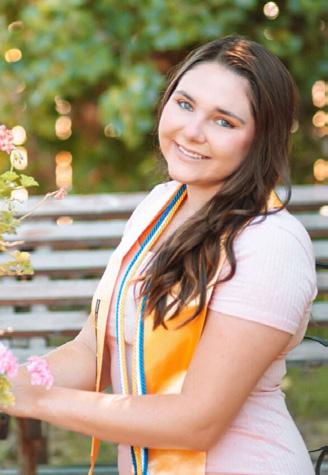

Fielding Clinical Psychology students Brittnie Pemberton and Mary-Joy Marsh each awarded $25,000 scholarships. These highly competitive awards from the California Behavioral Health Scholarship Program support the development of a diverse and dedicated behavioral health workforce across the state. As part of the scholarship, the recipients commit to a 12-month service term, providing direct mental health care in underserved California communities.
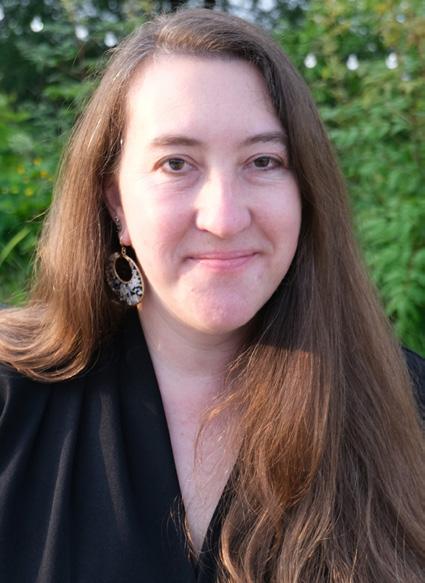
2023 Kipnes awardee secures new grants. Jenny Fremlin, PhD (Media Psychology ’12), Institute for Social Innovation Fellow at Fielding Graduate University, and owner of A’Flourish Media Psychology LLC, continues to advance impactful health equity research through her collaboration with Glyciome, a bioscience company focused on microbiome health. Supported in part by Fielding’s Dianne Kipnes Social Innovation Award, Dr. Fremlin is contributing to the development of an educational app and ongoing digital health strategies designed to improve outcomes for women in underresourced communities. This work recently received additional recognition when Glyciome secured a matching grant from the Health Sciences and Services Authority (HSSA) of Spokane County WA for economic development in biosciences, as well as a separate HSSA award to support grant writing. In 2024, Glyciome
was awarded a landmark U.S. patent for its prebiotic cervical cancer prevention method, followed in 2025 by a second patent for its Wild & Pure EcoBalance Cleanser line — both grounded in microbiome science. Fremlin notes that this recognition reflects how research supported by media psychology and social innovation can contribute to transformative public health solutions.
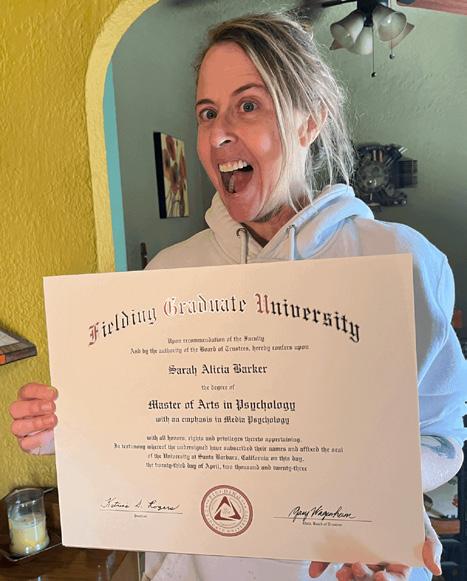
We love this photo! A shoutout to Fielding student Sarah Barker who earned her MA in Media Psychology and continues working toward her PhD. Barker shared how her journey is one of transformation, deep inquiry, and renewed purpose. Her goal is to help shape how we engage with media in ways that foster psychological well-being, critical thinking, and conscious communication.
Barker continues her doctoral research while working as a learning innovator in AI, adult learning, and embodied design. Barker noted that she is thankful for a Fielding scholarship she received two years ago that aided in her continued virtual reality research. Since then, her Why Virtual Reality? podcast series has won awards recognition as an official selection of NewsFest (2024) and as an official selection of NZWebfest (2024).
Fielding invites all students, faculty, and alums to share their accomplishments (and photos!) here: www.fielding.edu/news/share-your-accomplishments
Students, faculty, and alumni — think of the dreamers, the changemakers, the quiet thinkers you know. If someone in your life is seeking purpose, impact, or a deeper path forward, always remember to introduce them to Fielding! A simple conversation with friends and colleagues could open the door to transforming lives. Invite them to learn more here: www.fielding.edu and here: www.fielding.edu/events




































































Dianne Kipnes, PhD (PSY ’98), embodied what it means to be a changemaker. As a Fielding alumna, trustee, clinician, and philanthropist, she was a force for thoughtful innovation, whose generous spirit and intellectual rigor left a profound impact on those fortunate enough to work with her, learn from her, and dream alongside her.
Dr. Kipnes’s journey to Fielding began with a deep commitment to lifelong learning. As the first in her family to attend university, she earned a Master of Social Work from McGill University and a PhD in Clinical Psychology from Fielding, where her dissertation explored group cohesion and psychological outcomes in shortterm therapy — a reflection of her enduring interest in emotional connection and human healing.
While practicing in the pioneering Psychiatric Walk-In Clinic at the University of Alberta Hospital, Dr. Kipnes honed her skills as both clinician and innovator. Her ability to see unmet needs and imagine new solutions would become a hallmark of her life’s work. Alongside her husband Irv, Dr. Kipnes co-founded the Dianne and Irving Kipnes Foundation, a philanthropic powerhouse that brought vision and vitality to causes they held dear. From championing veterans’ care through the Kipnes Centre for Veterans, to sustaining the arts through the Edmonton Opera, to supporting breakthroughs in medical research, Dr. Kipnes’s impact was as far-reaching as it was heartfelt. In 2025 the Foundation provided a $2 million gift to Fielding to endow the Dr. Dianne Kipnes Scholarship in Clinical Psychology.
The 2025 Dianne Kipnes Social Innovation Award honors two outstanding Fielding alumni — Dr. Lucinda Garthwaite and Dr. Christy Gliniak — whose visionary work demonstrates the power of scholarship in action.
These changemakers embody the legacy of Dr. Dianne Kipnes — leading with innovation, compassion, and bold vision. Their work reflects the very mission of the Kipnes Award: to support collaborative projects of Fielding alumni who transform insight into action and improve lives across communities and generations.
Dr. Charles McClintock, Director of Fielding’s Institute for Social Innovation and Dean Emeritus, noted: “Dr. Garthwaite and Dr. Gliniak exemplify the Fielding scholar-practitioner model at its best — where rigorous academic inquiry meets meaningful, community-centered action. Their projects not only reflect the spirit of social innovation that Dianne Kipnes envisioned, but they also represent the kind of courageous and collaborative leadership our world urgently needs.”
Within the Fielding community, her legacy is especially vivid. Dr. Kipnes served on Fielding’s Board of Trustees, lending her insight and energy to advance the university’s mission. In 2016, she established the Kipnes Endowment for Social Innovation, a visionary fund that supports alumni-led projects addressing critical social needs through collaboration and creativity. And in 2018, she and Irv made a transformative gift to endow what is now the Dr. Dianne Kipnes Library — Fielding’s digital global library — offering students and alumni remarkable access to hundreds of thousands of scholarly resources.
Her belief in integrative and accessible education aligned seamlessly with Fielding’s philosophy of lifelong learning. She understood that knowledge should empower people to make meaningful change in their communities, and she gave generously to help others continue that work.
Dr. Kipnes’s presence at Fielding was marked by both intellectual brilliance and genuine warmth. Fielding President Emerita Katrina S. Rogers, PhD, captured this beautifully: “Dr. Kipnes will be deeply missed for her smile, her wisdom, and her love of life. She epitomized what it means to be a Fielding alum. Her light will continue to guide us, and her memory will always be a source of inspiration.”
Today, the changemakers of Fielding are forever grateful to Dr. Kipnes. Her life was a masterclass in purpose-driven action. Her legacy lives on — in the library that bears her name, in the Kipnes Endowment’s ongoing scholarships, in the students she inspired, and in the better world she helped to build for others.
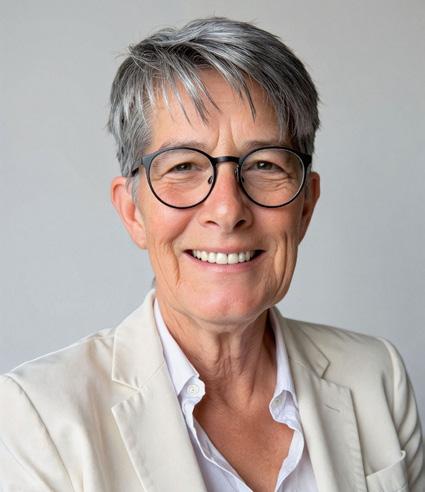
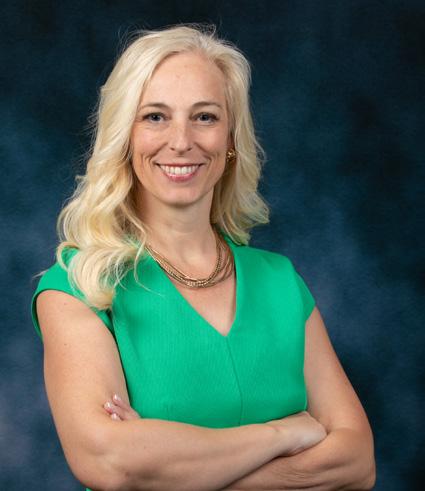
Lucinda Garthwaite, EdD (ELC ’14), Founding Executive Director of the Institute for Liberatory Innovation, is recognized for advancing social justice through systems change. Her project offers workshops that engage organizational partners in a transformative framework rooted in liberatory equity.
Christy Gliniak, PhD (IECD ’22), a neonatal occupational therapist and Fielding faculty member, is celebrated for her groundbreaking project, The Preterm Sleep Bundle. In collaboration with international research institutions, her initiative seeks to standardize sleep strategies in NICUs to optimize brain development in medically fragile infants.

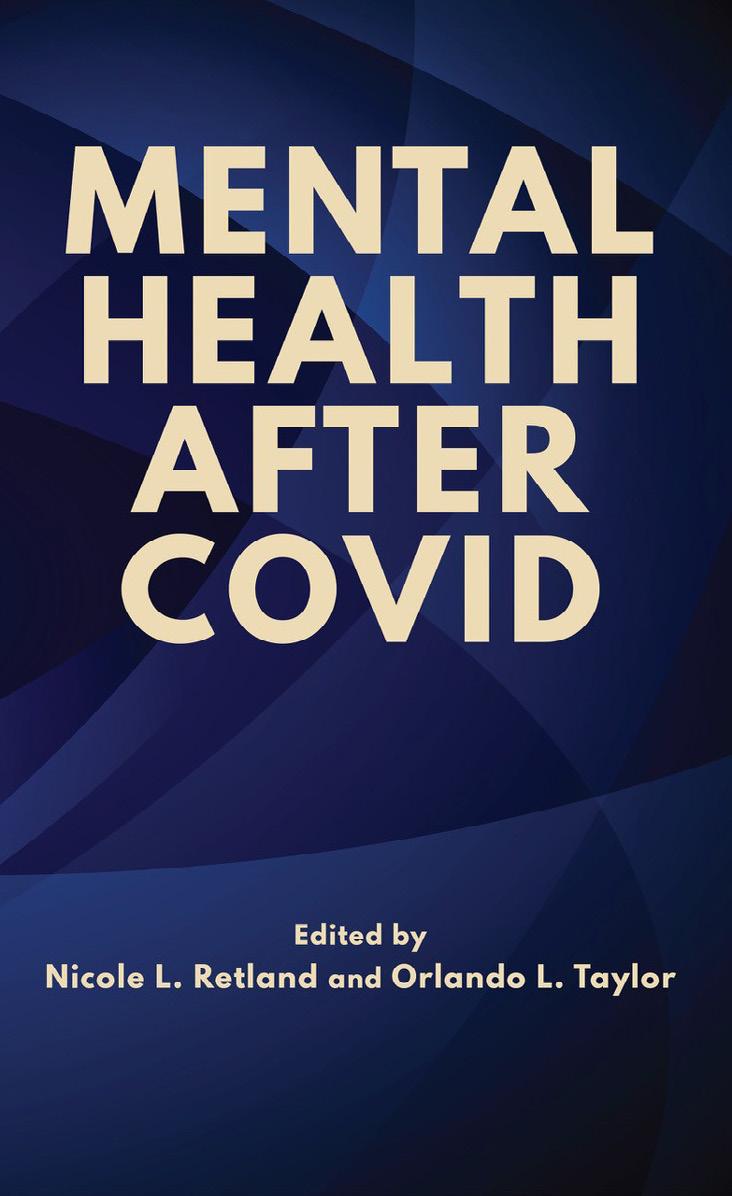
The Future of Navajo Education: An Empowering Overview of Education Initiatives in the Navajo Nation
Edited
by Barbara Mink, EdD, and Miranda Haskie, EdD
The Future of Navajo Education (Vol. II) offers an inspired and forward-looking examination of how Navajo educators are redefining and strengthening education both within the Navajo Nation and beyond. Edited by Dr. Barbara Mink and Dr. Miranda Haskie, this volume brings together original research grounded in the cultural values, philosophies, and lived experiences of the Diné people. The work highlights the commitment of Fielding Graduate University alumni — practitioners and scholars from the Navajo Nation — who continue to shape education through service, scholarship, and cultural stewardship.
Rooted in community, many contributors work in Navajo schools or in neighboring towns, bridging Indigenous and Western approaches to learning. Each chapter presents contemporary applications of enduring Diné principles, illuminating how Navajo education can thrive in the 21st century while remaining deeply connected to ancestral knowledge.
As Navajo Nation President Dr. Buu Nygren affirms in the book, “For our people to be successful, we need to pursue Navajo educational sovereignty.” This volume stands as a vital contribution to that vision — empowering students to engage with the world through the lens of their language, culture, and identity.
Edited by Nicole Retland, PhD, and Orlando Taylor, PhD
Mental Health After COVID offers a timely and necessary reflection on how higher education has been reshaped by the global pandemic. Edited by Dr. Nicole Retland and Dr. Orlando Taylor, this volume gathers research that examines the profound psychological, social, and institutional impacts of COVID-19 — particularly among communities already facing systemic disparities, such as African Americans.
Drawing on studies from multiple institutions, the book explores the rapid shift to online learning, the surge in mental health symptoms, and the deepening of existing health inequities. Yet beyond the crisis, this work underscores the imperative to carry forward the insights gained. Rather than returning to pre-pandemic
norms, institutions are called to reimagine themselves with resilience, equity, and wellbeing at the center.
An initiative of the Center for the Advancement of STEM Leadership (CASL) — a National Science Foundation–funded partnership — this volume features contributions from leaders at the University of the Virgin Islands, North Carolina A&T State University, Fielding Graduate University, and AAC&U. It serves as both a scholarly resource and a call to action. Dedicated to the late Dr. Orlando L. Taylor, Distinguished Senior Advisor to the President of Fielding, this book stands as part of his enduring legacy in advancing inclusive, responsive education in times of profound change.
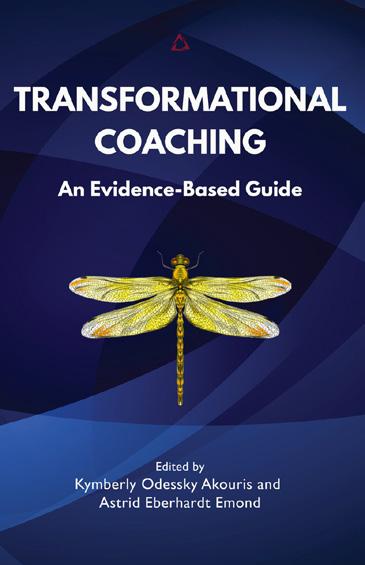
Fielding University Press (FUP) marks a new milestone in its 10-year history with the launch of its audiobook publishing program, expanding its commitment to scholarly accessibility.
In response to the rapidly growing demand for audiobooks, FUP is now converting select titles from its catalog into highquality audio editions. Leading this initiative is Managing Editor Dr. Jean-Pierre Isbouts, a professor emeritus at Fielding Graduate University and a bestselling author of more than 30 titles published by National Geographic, St. Martin’s Press, Sterling Publishing, and others. With his extensive experience in both academic and commercial publishing, Dr. Isbouts brings vision and expertise to this new format.
Since its founding in 2014, Fielding University Press has served as a dynamic platform for the research and voices of Fielding Graduate University’s students, alumni, and faculty. With more
than 42 titles published from more than 150 scholars worldwide, FUP’s expansion into audiobooks brings these works to an even broader audience.
FUP’s first audiobook, released in May 2025, is Transformational Coaching: An Evidence-Based Guide, edited by Kymberly Akouris and Astrid Eberhardt Emond. Previously published in hard copy and e-book format by FUP, this practical and insightful resource explores how coaching can serve as a tool for systemic transformation during a time of ongoing global disruption. As the first in what promises to be a robust audio catalog, this release signals a new chapter in Fielding’s scholarly publishing.
Since May, FUP has published more audiobooks from its catalog, including Living Well, Dying Well by Judy Stevens-Long, PhD; Leadership Coaching in China edited by Marjorie Woo, PhD; The Sexual Misconduct Prevention Guidebook by Laura McGuire, PhD; Real Characters edited by Karen Shackleford, PhD; Leadership Starts with You by Whitney Breer, PhD; and Struggling with Infertility by Sharon Schönteich, PhD.
Five additional audiobooks are planned for release by FUP this year.

Kymberly Akouris
PhD Candidate, Human Development | MBA | ACC, ICF-Certified Coach
Kymberly Akouris is an Associate Certified Coach (ACC) and dynamic leader dedicated to empowering individuals through research-driven coaching methods.
With an MBA in Leadership and Management, a master’s in Human Development, and a Certificate in Comprehensive Evidence-Based Coaching from Fielding Graduate University, Akouris stands at the forefront of innovation in transformational coaching. Currently completing her PhD at Fielding, her dissertation investigates how brief, structured group coaching can enhance well-being in adults facing adversity, drawing on basic psychological needs theory.
Akouris co-edited Transformational Coaching: An EvidenceBased Guide with Astrid Emond, contributing both the prologue and a pivotal chapter. Her work reflects a deep belief that coaching is not merely a method, but a movement — one that fosters clarity, resilience, and real, sustainable change.
Inspired by her own transformative journey that began with Fielding’s coaching program in 2017, Akouris is committed to helping others navigate life’s transitions with strength and purpose. She is a passionate advocate for evidence-based coaching practices that elevate both individuals and communities. As a coach, researcher, and writer, Akouris models a vision of coaching as a catalyst for transformation — where science, compassion, and human potential come together to build a better future.
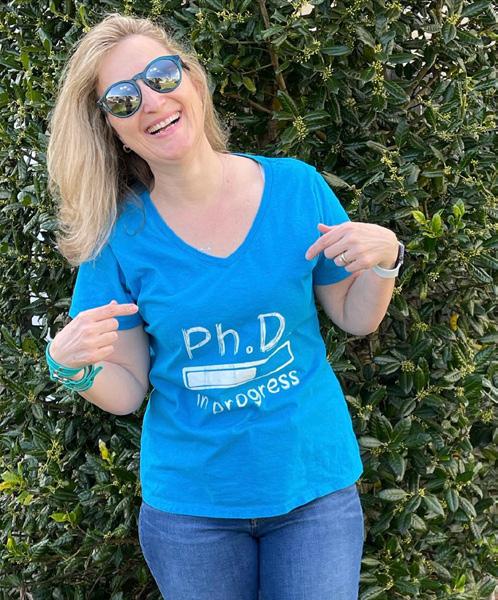
Astrid Eberhardt Emond
PhD Candidate, Human Development | ACC, ICFCertified Coach
Astrid Eberhardt Emond is a changemaker working at the vital crossroads of human development, leadership, and nature’s restorative power. As a senior manager at a law firm and an ICF Associate Certified Coach (ACC), she brings both professional discipline and deep empathy to her coaching and research practice. Currently completing her PhD in Human Development at Fielding Graduate University, her dissertation explores how nature-based adventures can foster personal transformation — particularly among women who have experienced significant life hardships. Her work aims to redefine what “adventure” means by making it accessible to individuals of all abilities and life stages. Her chapter in Transformational Coaching: An Evidence-Based Guide is grounded in personal experience — living with a serious health condition— and informed by her early dissertation research. With a focus on making healing and growth more inclusive, she encourages coaches to view nature not simply as a setting, but as a partner in the transformation process.
By combining evidence-based strategies with a reverence for the natural world, Eberhardt Emond seeks to inspire both coaches and clients to embrace their journeys as a source of resilience, insight, and shared renewal — planting seeds for transformation on both individual and collective levels.

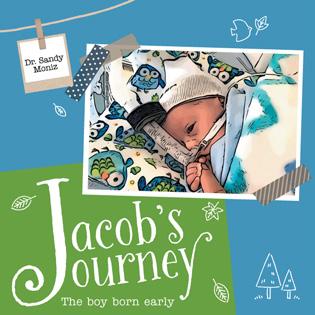

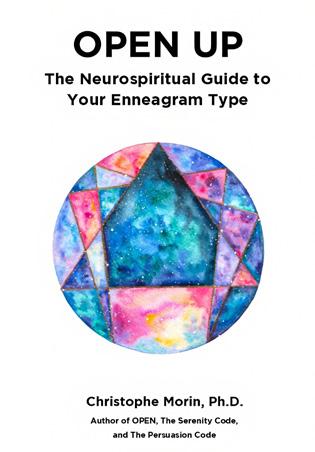

Alberto De Biasi, PhD (ODC ’20), authored L’Arte del Talento — come riconoscerlo in se stessi e negli altri e come svilupparlo (translation: The Art of Talent — How to recognize it in oneself and others and how to develop it) (Guerini Next, 2024).
Sandy Moniz, PhD (Clinical Psychology ’14) authored Jacob’s Journey: The Boy Born Early (FriesenPress, 2019). Dr. Moniz is a Registered Clinical and Forensic Psychologist.
Christophe Morin, PhD (Adjunct Faculty, Media Psychology), authored Open: A Neurospiritual Exploration of the Self-Healing Power of Your Brain (Depth Insights, 2025). Dr. Morin runs a retreat center in Hawaii with his wife, also a psychologist. Together, they teach and apply the principles described in their latest books.

Lisa Kim (HOD student) authored “An Integrative Coaching Approach for Modern Managers” (NCURA, 2025).
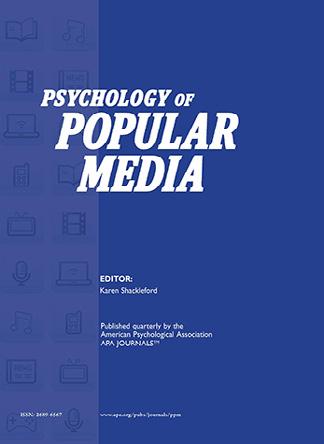
Karen Shackleford, PhD (Media Psychology Faculty), Editor of the APA journal Psychology of Popular Media, co-authored with P. A. Reed, J. D. Cohen, and M. J. Robbins “Qualitative and Quantitative Investigations of Office Fans’ Connections With Fictional and Celebrity Couples: Identification, Parasocial Relationships, and Beyond” (Psychology of Popular Media, 2024). Fielding note: Shackleford recently won an American Psychological Association Presidential Citation for her service to APA’s Division 46: Media Psychology & Technology.

Christophe Morin, PhD (Adjunct Faculty, Media Psychology), authored Open Up: The Neurospiritual Guide to Your Enneagram Type (Depth Insights, 2025).
Sara A Moore (Clinical Psychology student), Sandra Barnes (Clinical Psychology ’17), Anthony F. Greene (PhD, Faculty Chair, Clinical Psychology) co-authored with faculty
James E. Vivian, April E. Fallon, and Leanne J. Katz Levin “Moderators of the Maternal Association Between Spanking and Behaviour Problems in At-Risk Black and White Children” (Journal of Mental Health and Social Behaviour, 2025).
Roel Krabbendam (architect, EdD student Leadership for Change, and Fielder Fellow) authored “Bored or Burned Out? Re-Imagining School Facilities to Better Support Teachers and Students” (Education Today, 2025).
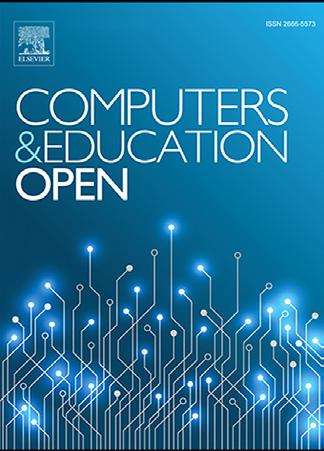
Danielle Sonnenberg, PhD (HOD ’24 and professor at Berkeley College) and Pamela Rutledge, PhD (professor emerita at Fielding Graduate University, Media Psychology) authored “Online Education Benefits Instructors’ Emotional Labor Management” (Computers & Education Open, 2024).
Mark your calendars and get ready for an unforgettable experience. Fielding’s 2025 Global Session and Graduation Ceremony will take place November 15–20 at the Hyatt Regency Cincinnati, with the Graduation Ceremony on Thursday, November 20. This is the opportunity of the year to join students, alumni, faculty, and staff from across the globe for a week of academic offerings, community connection, and celebration. Whether you’re graduating, attending sessions, or simply joining to support peers, everyone is welcome.
Graduates must register to walk by August 1 — don’t delay! Registration is complimentary. Even if you’re unsure about attending, registering
early guarantees your spot in the celebration. No late registrations to walk will be accepted.
The Hyatt Regency Cincinnati is our host hotel, offering a discounted room rate for Fielding participants at www. hyatt.com/en-US/group-booking/ CINCI/G-KFG7. Book early to secure your room.
The Registrar will soon send out a registration link for Global Session, along with a schedule of events outlining which schools and programs will be featured on specific dates. We encourage you to become part of the most inspiring Fielding event of the year. Together let’s celebrate your achievements and the power of our global community. We can’t wait to see you there!

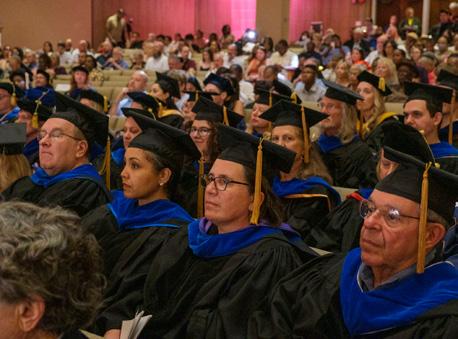



In recognition of their profound commitment to equity, inclusion, and immigrant justice, Fielding Graduate University and the Marie Fielder Center for Democracy, Leadership, and Education are proud to present the 2025 Marie Fielder Medals for Social Transformation to two outstanding organizations: Woori Juntos and the Coalition for Humane Immigrant Rights (CHIRLA). The awards will be conferred at Fielding’s 2025 Convocation in November, during the university’s Global Session in Cincinnati, Ohio.

Woori Juntos, a Houston-based organization dedicated to immigrant rights, civic engagement, and community empowerment, is one of the 2025 honorees. Their advocacy work — including citizenship navigation, language access, and leadership development — embodies the spirit of Dr. Marie Fielder’s legacy of civil rights and transformational justice.
Accepting the award on behalf of Woori Juntos will be QuynhHuong Nguyen, the organization’s communications manager
and a current Fielding student. Nguyen will also celebrate a personal milestone at the Convocation, as she is set to receive her PhD in Applied Psychology. Her dual role as an activist and scholar beautifully reflects Fielding’s mission to nurture scholarpractitioners driving systemic change.
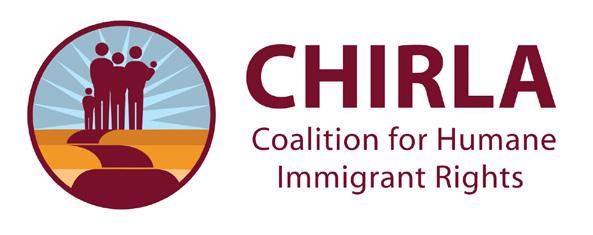
For more than three decades, the Coalition for Humane Immigrant Rights (CHIRLA) has stood at the forefront of the immigrant rights movement. Based in California, CHIRLA leads powerful initiatives focused on policy advocacy, leadership development, and family support services. Their tireless work has uplifted immigrant communities and challenged structural inequities at local, state, and national levels.
Fielding proudly honors CHIRLA for exemplifying the values of Dr. Marie Fielder, an educational trailblazer whose civil rights activism reshaped California’s public school systems. By awarding CHIRLA this prestigious medal, Fielding acknowledges their unwavering dedication to justice, belonging, and social change.

Fielding’s Dr. Laszlo Joins “Leadership Challenged” Panel.
Alexander R. Laszlo, PhD, Doctoral Faculty in Sustainability Leadership within Fielding’s Human & Organizational Development programs, was featured in the recent Leadership Challenged panel discussion, From Leadership Challenged to Future Leaders. Hosted by EcoCiv, the series explores how outdated tools, leadership models, and rigid structures, shaped by the dominant Western paradigm, are failing to meet the urgent and complex needs of today’s world. Dr. Laszlo joined thought leaders in envisioning transformative approaches to leadership for a sustainable future.
The Great Courses documentary series Searching for People & Places of the Bible, written and directed by Dr. Jean-Pierre Isbouts — Fielding Professor Emeritus and Managing Editor of Fielding University Press — has been awarded the 2025 Silver Telly Award in the Best Religion & Spirituality Series (Non-Broadcast) category. In the series, Dr. Isbouts guides viewers through archaeological and historical sites connected to key biblical narratives.
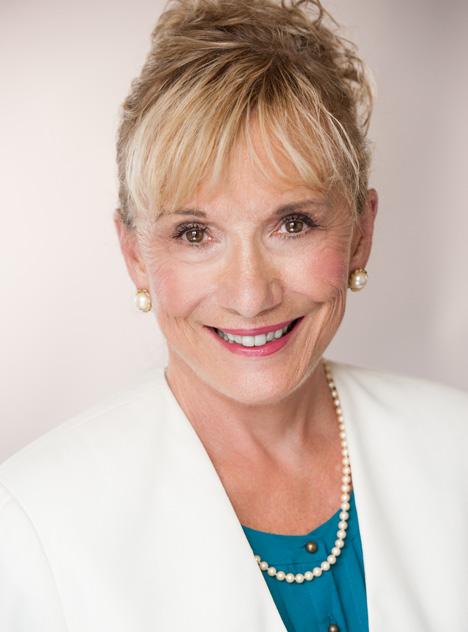

Dr. Judith Stevens-Long, Professor Emerita and former Associate Dean at Fielding Graduate University, has been named to Marquis Who’s Who for her distinguished career in adult development and end-of-life studies. A renowned scholar, author, and educator, she created Fielding’s first online master’s program and is the author of Adult Life and Living Well, Dying Well. Her leadership, writing, and dedication to lifelong learning continue to shape the field and inspire others.
Students from Fielding Graduate University’s Clinical Psychology Certificate Program made a remarkable impact at the 2025 Association for Psychological Science Annual Convention in Washington, D.C., delivering 38 research presentations. Additional students attended to gain professional experience and connect with leaders in the field. This strong showing highlights the program’s emphasis on hands-on research, scholarly engagement, and preparation for doctoral training in clinical psychology. Fielding proudly celebrates their success and contributions to the field.

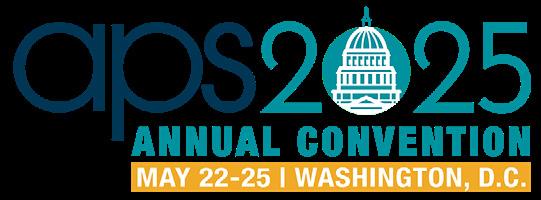
This bold new student-led initiative, spearheaded by Clinical Psychology doctoral student Andrew Sears, invites all students, faculty, staff, and alumni to brainstorm, collaborate, and lead transformative climate action. On Earth Day, the Alliance hosted a groundbreaking event that connected K–12 students from across the United States with leading climate researchers at Fielding. “Our vision is to transform Fielding into a climate institution,” Sears said, adding, “We need many, many, many more researchers researching climate change across all schools at Fielding. Meanwhile, the Climate Alliance welcomes the Fielding community to Climate Family, an ongoing series of Friday night Zoom gatherings happening now.” The Alliance is also preparing to launch The Climate Research Lab this autumn — a longitudinal climate study on children as they experience climate throughout childhood.
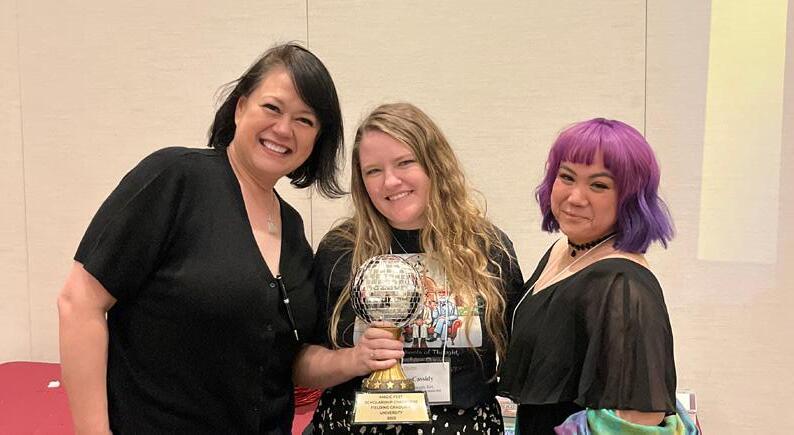
Fielding recently celebrated the success of this year’s Magic Feet Fundraiser and Karaoke Evening, with special recognition for the San Francisco ProSem team, who swept the top honors. Their creativity and commitment earned them awards for Most Creative Basket, Most Creative and Highest Fundraiser, and Most Funds Raised. Thanks to their efforts at the May fundraiser and the generosity of the entire Fielding community, more students will be able to continue their educational journey.
Fielding students, alumni, and faculty played a prominent role at the 7th International Schutz Circle for Phenomenology and Interpretive Social Science in April at the University of Vienna. The conference, themed “Personalities, Pragmatic Affairs, and Playful Worlds,” honored the legacy of Austrian philosopher Alfred Schütz. Fielding’s strong presence featured multiple panels led by Dr. Valerie Bentz (who will retire this year after 33 years on faculty), and contributions from current students, alumni including Dr. Evi Beck (a film about Dr. Beck’s life, Never In My Wildest Dreams, premiered in Vienna the following week), and international collaborators, exploring transformative phenomenology, mindful inquiry, and creative approaches to bridging social worlds through music, art, and scholarship.
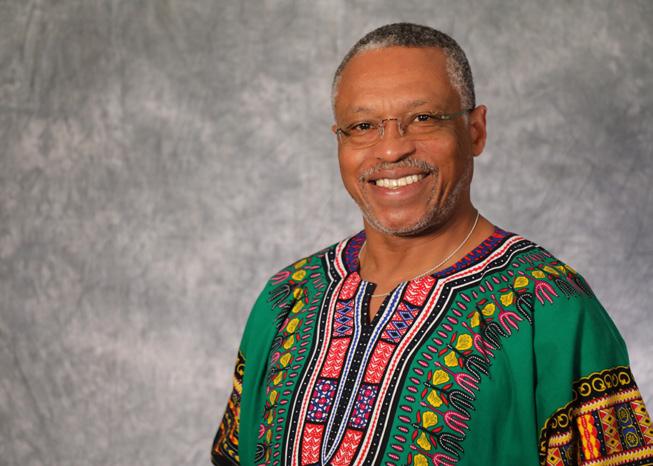

Anthony Greene, PhD, Faculty Chair and Core Faculty in Clinical Psychology, has been named the 2025 recipient of the prestigious Charles and Shirley Thomas Award by Division 45 of the American Psychological Association (APA). This national honor recognizes his outstanding mentorship, student development, and long-standing commitment to making psychology more responsive to the needs of the African American community. Named for two trailblazers in psychological mentorship and community advocacy, the award will be presented to Dr. Greene during the APA Convention in Denver in August.
Fielding on the Global Stage at ATD 2025.
Fielding Graduate University proudly joined the 2025 Association for Talent Development (ATD) International Conference & EXPO in Washington, D.C. — a global gathering of leaders and professionals in learning and talent development. With thousands in attendance, the event featured inspiring keynotes from Olympic champion Simone Biles on resilience and author Seth Godin on leading change, sparking essential conversations about the evolving workplace. Fielding doctoral student Kerri Valencia represented the university, engaging in sessions on leadership development and organizational transformation, underscoring Fielding’s commitment to supporting scholar-practitioners who are advancing the future of work and learning worldwide.

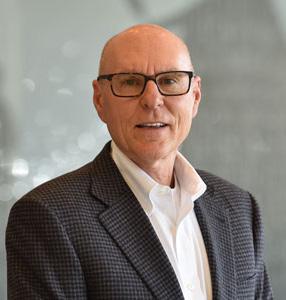

Fielding alumna Dr. Brenda Barker Scott and faculty member Dr. Mike Manning have been awarded the prestigious McGregor Award from the Journal of Applied Behavioral Science for their co-authored paper, “Designing the Collaborative Organization: A Framework for How Collaborative Work, Relationships, and Behaviors Generate Collaborative Capacity.” Their work, developed during Scott’s doctoral studies at Fielding, explores the dynamics of organizational change and leadership. “I hope this recognition helps spotlight the university’s commitment to academic excellence and impactful scholarship,” Scott said.
BY CATHERINE RYAN
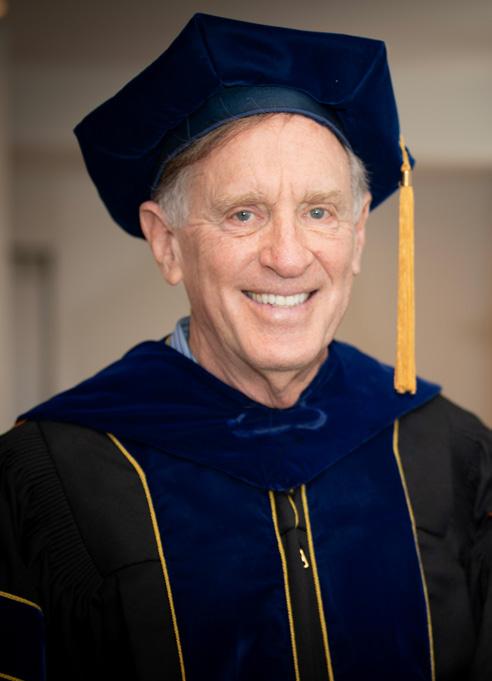
It is hard to imagine Fielding Graduate University without the quiet, measured voice of Charles McClintock carrying through a hallway or across the hum of a virtual seminar. You might find him in conversation with a doctoral student, trading insights with a colleague, or simply listening — always listening. He served students and faculty alike as an empathetic presence, the kind of mentor who made guidance feel organic, never performative.
Now, after 24 years at Fielding and more than five decades in higher education, McClintock stepped into retirement this June. But the imprint of his changemaking work remains unmistakable. “Charles, your legacy endures in the lives you’ve touched, the programs you’ve built, and the ideals you’ve championed,” related Fielding President John L. Bennett, PhD, during McClintock’s retirement celebration.
Like the trailing resonance of a well-struck piano chord — McClintock’s instrument of choice — his influence continues to echo across Fielding, a reminder that meaningful change is both possible and deeply human.
McClintock’s tenure at Fielding included 11 years as Dean of the School of Human and Organizational Development (HOD), and later as Director of the Institute for Social Innovation (ISI), a center he helped to found in 2006. There, he built programs that served the university and extended its reach, locally through partnerships with Santa Barbara nonprofits, and nationally through initiatives with organizations such as the National Science Foundation. Yet, McClintock’s work was never about reach alone. It was about depth. Under his deanship, the HOD program underwent a sweeping reimagination. Curricula were sharpened, faculty were recruited with an eye toward diversity and mentorship, and concentrations emerged — transformative learning, creative longevity, sustainability — that sounded more like provocations than academic tracks. They asked: What could education do beyond career advancement? Could it change lives? Could it spark wisdom? The answer, under McClintock’s stewardship, was always yes. “He showed me what Fielding could be,” said Patrice Rosenthal, PhD, Fielding’s Human and Organizational Development Interim Program Director. “He elevated graduate education from the mundane to a place of magic and mystique.”
At Cornell, where McClintock served for 27 years and then at Fielding for 24 years, McClintock cultivated not just programs, but possibility. As a dean at Fielding, he initiated the now-renowned Evidence-Based Coaching certificate and helped bring forth Fielding’s first external grant. He co-created endowments with his wife, Carol Wilburn, and supported scholarships for leadership and innovation. Along the way, he never stopped writing, never stopped playing piano, never stopped asking students the kind of questions that leave you thinking for days.
McClintock advanced the scholar-practitioner model across Fielding’s programs, integrating theory with real-world application and reinforcing its central role in the university’s identity. ISI, for example, has supported more than 125 Fielding alumni as fellows and launched leadership certificates for women in STEM and diversity-focused team coaching. It is, in short, a living reflection of its founding director: intellectually serious, unpretentious, and unafraid to act on big ideas.
“He placed great emphasis on the practical — on getting things done,” said David Blake Willis, PhD, Fielding Professor of Human and Organizational Development. “But always as a gentle soul. And, oh my! What a great piano player.”
Indeed, McClintock’s musical life offers a fitting metaphor for his professional one. To hear him perform, whether with a Santa Barbara jazz trio or at a university reception, is to witness a rare kind of presence: attuned, responsive, and harmonically aware. Playing well with others, like leading well, begins with listening — something he practiced with unwavering skill at Fielding.
Perhaps it’s no surprise that McClintock hails from a family of educators. “I have education in my DNA,” he reflected recently. “I was lucky to be at the right place at the right time when I came to Fielding. But despite luck, there’s also destiny,” he added.
Destiny may be the only force strong enough to describe a life so devoted to helping others find their own paths.
Now, with meetings fewer and office hours behind him, McClintock says he plans to turn toward the rhythms of a different kind of composition. The piano — long a faithful companion — will take on a larger role.
Those who’ve worked beside McClintock know that his retirement will prove to be another exceptional arrangement. The tempo may shift, the themes may evolve, but the underlying melody — McClintock’s commitment to learning, to connection, to purposeful action — will continue to play on: inspiring, clear, and resonant.

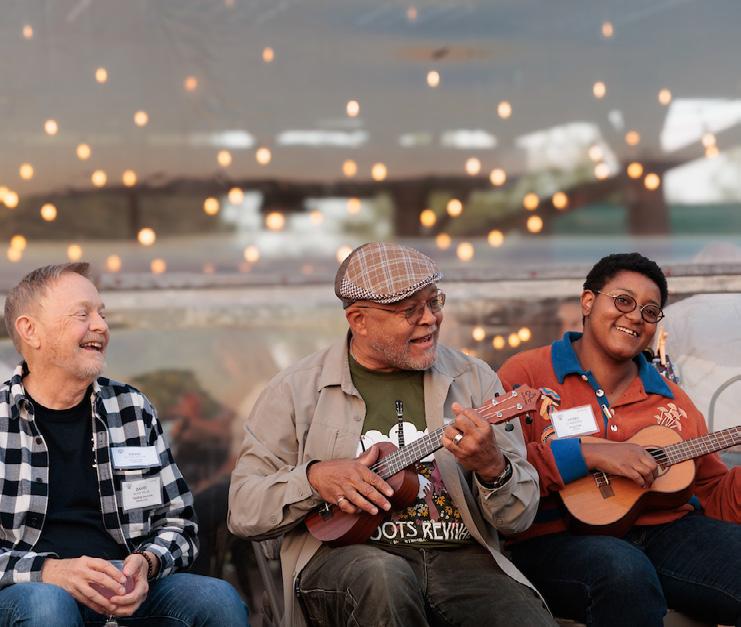

The power of folk schools, originally derived from the Danish Folk High School model, can be seen in the ancient tools of storytelling, song, dance, art, and craft that take place in these cohesive and collaborative educational communities. To build and strengthen community through the use of these tools and dialogue, members of Fielding Graduate University, the Folk Education Association of America, the African American Craft Alliance, and the John C. Campbell Folk School recently came together in a series of events. Bonding seemingly separate communities and bridging differences in effective, transparent, and innovative new ways was the goal and the outcome of this research project.
Beginning in 2022, a coordinating team of community and Fielding Graduate University action researchers began formulating strategies and action plans for strengthening connections and collaboration between the Smithsonian’s African American Craft Initiative and the John C. Campbell Folk School. After a full year of joint strategizing, site visits to the folk school and to the Highlander Research and Education Center, followed by action planning, the events were launched in the summer of 2023 with cross-community learning opportunities and cohort artist residencies. With each step of the planning and implementation process, project participants have engaged with a cycle of observation, analysis, and further planning. Through systemic processes and circumstantial challenges, the project has generated new knowledge, new partnerships, and close relationships.
Project activities culminated in a long weekend at the John C. Campbell Folk School in April 2025. This folk school, reaching 100 years old this year, has served its North Carolina mountain community as a center for farming education, a cooperative
organizer for farmers and, in recent decades, a school promoting and preserving Appalachian craft and culture. Where the folk school has not succeeded is in its representation of the full diversity of the Appalachian region, namely Black and Affrilachian communities. After years of attempting to connect with these communities, the Bridging and Bonding project helped to support and boost the folk school’s efforts. During the April events, half of the school’s studios were staffed by African American or Affrilachian artists. A local community event, held at the Texana Community Development Club, was also featured. Various morning singing, seminars, and evening events celebrated the art, scholarship, and culture of African American and Affrilachian peoples.
Also during this long weekend, the process of participatory action research continued with a meeting of the African American Craft Alliance (formerly the African American Craft Initiative) for its next steps as an independent entity apart from the Smithsonian. Even as the grant-funded project comes to an end, the partnerships and action planning continue. Participatory action research not only generates co-learning and new knowledge but builds research and action capacities in communities and at the university for community-engaged research.
The year 2025 marks the third and final year of this 3-year participatory action research grant project funded by the AmeriCorps Office of Research and Evaluation. A research partnership between HOD faculty member David Blake Willis and HOD student Dawn Jackman Murphy forms the foundation of this grant project, their third grant-funded project since 2018. We invite you to learn more here: www.fielding.edu/office-of-research/americorps-research
Fielding Graduate University’s PhD program in Clinical Psychology is proud to welcome two esteemed scholars — Dr. Steven Howell and Dr. Ian Wickramasekera — to its core faculty. Their appointments this spring bring the number of core faculty advisors in the program to 23, further strengthening Fielding’s commitment to academic excellence, mentorship, and social justice in the preparation of future psychologist-leaders.
Fielding’s is the only distributed learning program of its kind to receive American Psychological Association accreditation.

Dr. Steven Howell: Bridging Research, Neuroscience, and Personality
Steven Howell, PhD, joins Fielding’s Clinical Psychology faculty with a distinguished background in cognitive psychology, computational neuroscience, and research methodology. As a Core Faculty member, he will lead research courses and support dissertation development as a quantitative methods specialist.
Dr. Howell earned his PhD in Cognitive Psychology from McMaster University, where he focused on language acquisition and early generative models of language. He continued this work as a postdoctoral fellow in computational modeling at the University of Wisconsin-Madison. Later, he served as technical manager at Princeton University’s Lab for Experimental Social Science, designing digital experiments to capture verbal behavior during group deliberations.
With more than two decades of teaching experience, including roles at Albion College, Kutztown University of Pennsylvania, and Keystone College, where he is currently a tenured professor, Dr. Howell is widely regarded for his expertise in statistics, cognitive neuroscience, and personality theory. His mentorship has guided countless students through the complexities of psychological research and data analysis.
“I love teaching at Fielding because of the students,” Dr. Howell said, adding, “They’re smart, accomplished, curious, and from a wide variety of backgrounds, which really enriches class discussions and seminars. As a Faculty Research Specialist at Fielding, I’m excited to help new graduate students grow, change, and become skilled researchers as well as psychologists.”
Dr. Howell’s current research explores topics such as evolutionary psychology, personality and friendship dynamics, the neuroscience of consciousness, and political psychology. His interdisciplinary
approach, grounded in rigorous methodology, will be an invaluable asset to Fielding students pursuing high-level, socially relevant dissertation work.

Dr. Ian Wickramasekera joins Fielding’s Clinical Psychology faculty as an award-winning psychologist and educator known for his innovative work in affective neuroscience, mindbody medicine, and transpersonal psychology. Dr. Wickramasekera will advise students in the Colorado Regional Professional Development Seminar (PDS) and teach across both the Clinical Psychology and Respecialization in Clinical Psychology (RCP) programs.
Known to most students as “Dr. Ian,” he earned his PsyD from the Illinois School of Professional Psychology and most recently served as Associate Professor of Psychology at Naropa University. A Fellow of the APA, he has received numerous honors, including the Clark L. Hull and Milton H. Erickson Awards for excellence in hypnosis research, and early career awards from both the APA and the American Society of Clinical Hypnosis.
Dr. Ian’s scholarship is as diverse as it is deep. His areas of focus include empathy, biofeedback, lucid dreaming, Bon-Buddhism, and psychoanalytic psychotherapy. Throughout his career, he has trained with influential figures in modern psychology — from Albert Ellis to Stanley Krippner — and developed a style that blends rigorous science with compassionate, experiential learning.
“I enjoy how my empathy and hypnosis research helps me to build bridges of understanding between the ancient traditions of indigenous wisdom and the simple but sometimes paradoxical nature of the science of hypnosis,” Wickramasekera said, adding, “I am obsessed with the study of hypnotic phenomena and helping others to open the doors of our innate potential to live better lives and appreciate the mysteries and beauty of life more fully, using the mind, body, and spirit.”
An inspiring teacher and clinician, Dr. Wickramasekera emphasizes relational ethics, clinical presence, and therapeutic alliance. He is known for integrating meditation and mind-body practices into both his clinical work and his classrooms. His students consistently describe his mentorship as life-changing, with many going on to lead, teach, and innovate within the field.
BY BRIAN CUTLER, PHD PROFESSOR AND PROGRAM DIRECTOR, MEDIA PSYCHOLOGY | SCHOOL OF PSYCHOLOGY
At Fielding Graduate University, Media Psychology students engage with the present and prepare for the future through hands-on research at the intersection of human behavior and evolving technologies. Whether pursuing the MA in Applied Media Psychology or the PhD in Psychology with an Emphasis in Media and Technology, Fielding students step directly into faculty-led research groups where theory, data, and real-world relevance converge.
Graduate education in psychology is built on the development of strong research skills. These are the tools that guide students through dissertations and into meaningful careers in applied psychology. Fielding’s Media Psychology programs offer a space where those tools are sharpened through collaboration, experimentation, and academic curiosity.
Research groups form the core of this experience. Each is anchored by a faculty mentor and a distinct area of inquiry, from video games and storytelling to artificial intelligence and cultural identity. Students engage with original projects, contribute to scholarly publications, and present findings at conferences. Along the way, they build lasting professional relationships — with faculty, peers, alumni, and researchers from beyond the institution.
The four Media Psychology research groups currently active at Fielding reflect the diversity and urgency of contemporary psychological questions.
Each of these labs supports students in developing a deeper understanding of how media technologies influence identity, behavior, and social norms. The experience is rigorous and collaborative, offering a meaningful foundation for doctoral work and professional practice alike.
These research groups also provide something less quantifiable but equally essential: a sense of belonging in an intellectual community. Students engage with challenging questions, support each other’s development, and contribute to scholarship that has impact beyond academia. Research here is both a method and a meeting place — where ideas form, grow, and occasionally shift the conversation altogether.
Students and alumni interested in joining one of Fielding’s Media Psychology research groups are encouraged to reach out. In a field defined by change, participation begins with curiosity and a readiness to explore what comes next. To learn more or get started, contact the faculty lead for the research group that aligns with your interests.
Video Game Research Lab
Led by Dr. Andreas Miles-Novelo, the Video Game Research Lab explores the psychology of gaming. The team investigates how individuals engage with virtual worlds, from avatar identification to emotional responses to violent content. This lab shares close ties with the Narrative Psychology Lab, directed by Dr. Karen Shackleford, forming a collaborative network of shared research assistants and co-authorship opportunities.
Entertainment media continues to shape how we see ourselves and others. Dr. Karen Shackleford’s lab examines audience relationships with fictional characters, celebrity culture, and recurring themes such as nostalgia, identity, and representation. Students explore how viewers form parasocial bonds, repeat-watch favorite stories, and respond to characters across dimensions like race, gender, and sexual orientation.
Society, Technology, and Subjectivity Lab
The STS-Lab, led by Dr. Patrick Sweeney, brings a critical and interpretive lens to research. Students in this group investigate the cultural and psychological impacts of media and technology on personal identity and social categories. Recent projects have explored the use of mental health apps, beliefs about data privacy, and algorithmic attempts to categorize gender. The lab encourages questions that bridge theory and lived experience.
Artificial Intelligence and Data Technologies Lab
The rapid evolution of AI and big data has raised new psychological questions.
In Dr. Regina Tuma’s lab, students examine how emerging technologies influence decisionmaking, perception, and social trust. Research topics include fear and resistance to AI, beliefs about algorithmic authority, bias in data systems, and the psychological effects of being sorted, predicted, and analyzed by machines.
By Lorraine Ehlers-Flint, PhD, Clinical and Developmental Psychologist, Faculty Chair Infant and Early Childhood Mental Health and Development, School of Psychology
This June two remarkable Navajo women — Michelle Spencer and Kamille White — received their EdD degrees from Fielding Graduate University’s School of Leadership Studies during a deeply moving graduation ceremony held at the Navajo Nation Museum Auditorium in Window Rock, Arizona. Surrounded by family, educators, and Fielding faculty, more than 80 attendees gathered to honor this milestone. It wasn’t just a graduation — it was a celebration of resilience, partnership, and leadership development that spans decades.
This was my first visit to the Navajo Nation, and it left a lasting impression. I had the honor of presenting at the preconference session of the 9th Annual Navajo Nation Education Conference thanks to an invitation from Dr. Miranda Haskie, a Fielding alumna, Associate Faculty, Diné College Professor, and changemaker. All events were well-attended and alive with inspiration, cultural richness, and a shared commitment to community transformation through education.
The conference highlighted research on the future of Navajo education, indigenous communities’ cultural identity, the power of language, creating positivity, intergenerational parenting, and making meaningful pathways to leadership. From Infant and Early Childhood Mental Health and Development (IECD) contributions on early relational health to the powerful narratives of Navajo scholars, it was clear: We need to support development not just in skillsets, but in relationships, reflective practice, and cross-cultural understanding.
Fielding’s IECD program reflects this ethos. Rooted in the science of human development, IECD promotes connection, communication, and respect — values that resonate deeply with Navajo traditions.
Fielding’s collaboration with the Navajo Nation is a model for how graduate education can serve as a vehicle for social change. Beyond degrees, it’s about developing scholar-practitioners and leaders who can make a difference in their communities while honoring where they come from, while demonstrating what is possible when institutions commit to long-term, reciprocal relationships. To date, over 30 Navajo scholars have earned doctorates from Fielding. Their work — rooted in community, culture, and courage — ripples outward to strengthen the systems that shape Navajo life.
What makes this relationship so impactful? It’s the mutual respect and intentionality embedded in our collaboration. Faculty like Dr. Barbara Mink and Dr. Jenny Edwards have sustained long-standing, heartfelt connections and mentorship with students. Leaders like

Dr. Allison Davis-White Eyes and Dr. David Blake Willis have shown up — not just professionally, but personally, underscoring how leadership and learning are intergenerational and communal.
As Navajo Nation President Dr. Buu Nygren shared in his extended opening remarks at the graduation, education is not just an individual journey — it’s a pathway to sovereignty, well-being, and the flourishing of an entire people. He reminded us that leadership in Indigenous communities must be both culturally grounded and academically equipped to navigate complex systems and champion solutions.
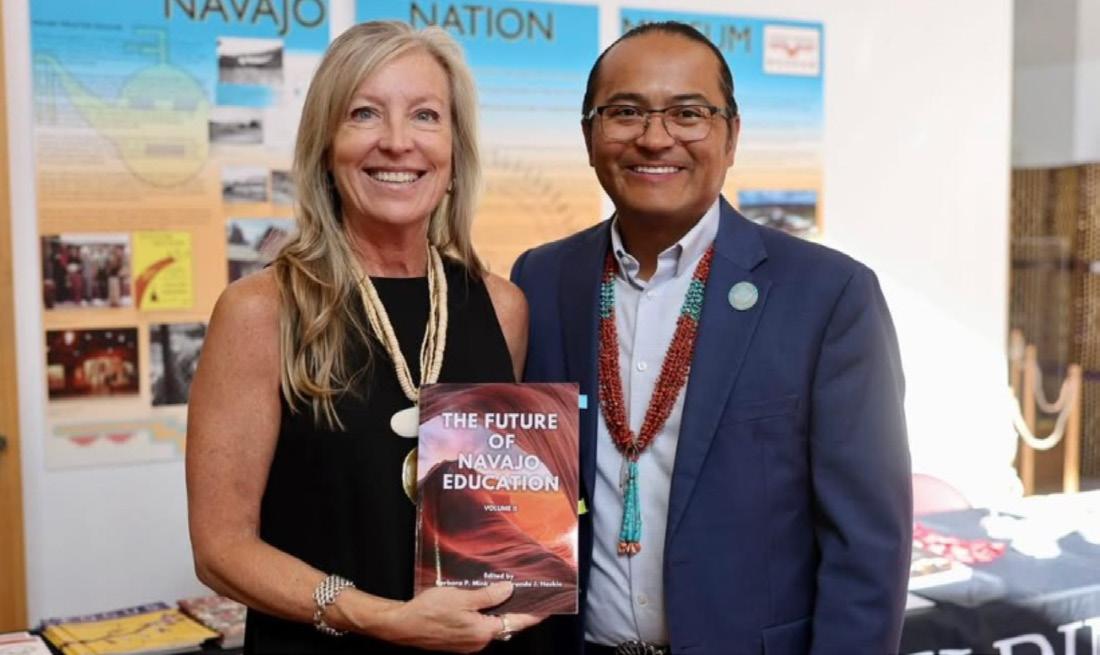
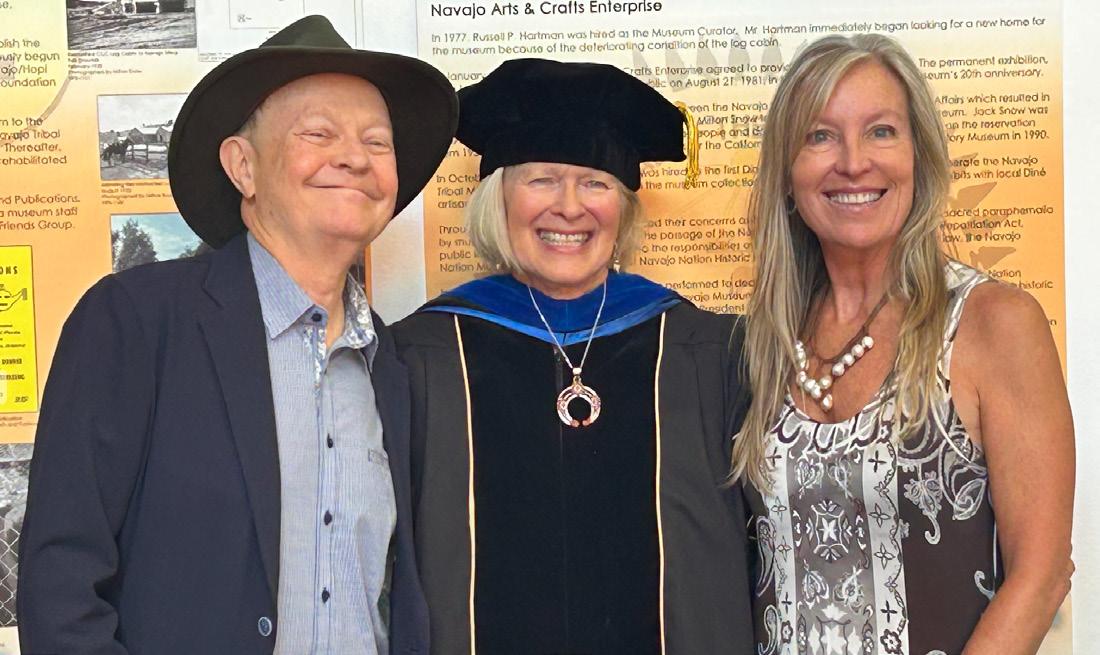
In this issue honoring changemakers, Dr. Okokon O. Udo invites us to consider what it means to choose joy amid uncertainty. With a voice both grounded and uplifting, he reflects on how we might face life’s unpredictability not with fear, but with purpose, resilience, and light. Blending personal truth with practical wisdom, Dr. Udo gently reminds us that the deepest transformations begin within — where courage is kindled, joy is cultivated, and light is not only found, but also shared.
By Okokon O. Udo, PhD, PCC, CPCC, CMC Program Director | MA, Organization Development & Leadership Program Director
| Evidence Based Coaching
Opening Reflection: Navigating a World of Unpredictability
In today’s ever-shifting landscape, uncertainty has become a constant companion. The unpredictability of life often brings with it pain and fear that touch us all. Yet, in times like these, we are reminded of the vital role of changemakers — those who choose to see possibility in challenge and light in darkness. As poet Amanda Gorman so powerfully writes, “There is always light, if only we’re brave enough to see it. If only we’re brave enough to be it.” This message calls each of us not only to face uncertainty but to become active participants in shaping joy and hope, both for ourselves and for the world around us.
Uncertainty challenges our comfort zones and stirs deep emotions. The pain it causes is undeniable — whether from global upheavals or personal struggles. However, if life were completely predictable and effortless, it would lack the growth and fulfillment that come from overcoming obstacles. As humans, we possess the unique ability to choose our responses and steer our lives. We hold the power to become captains of our destiny, even in turbulent times.
1. Honor Your Emotions
Give yourself permission to feel fear, sadness, or frustration. Naming your emotions is the first step toward managing them. Journaling, talking with a friend, or simply sitting with your feelings can bring clarity and calm.
2. Concentrate on Your Sphere of Influence
Uncertainty magnifies what’s out of our hands. Redirect your focus from uncontrollable circumstances to actions within your reach. Small daily steps — like reaching out to a loved one or setting intentions — can foster a sense of control and purpose.
3. Engage in Mindful Presence
Mindfulness practices — like meditation, deep breathing, or mindful walking — anchor you in the present moment. These tools are proven to enhance emotional balance, reduce anxiety, and increase resilience, helping you respond rather than react to stress.

4. Seek and Shine the Light
Amanda Gorman’s words remind us that light is both something we see and something we become. Look for moments of beauty and kindness. Celebrate small wins. And when you can, extend light to others, creating a ripple effect of positivity — sometimes, the act of giving light helps us find our own.
5. Strengthen Your Inner Resilience
Every challenge is an opportunity to build your capacity for courage, adaptability, and compassion. View challenges as opportunities to build courage and adaptability. Reflect on past hardships you’ve overcome. Draw strength from your own story and remember that you have weathered storms before.
Now What? Turning Insight into Action
Reading about resilience and joy is one thing — living it is another. So, now what? Start by choosing one small practice from the strategies above and integrating it into your daily routine. Share your journey with someone you trust or invite others to join you in seeking and sharing light. Remember, you don’t have to do it all at once. Progress is built on consistent, compassionate steps forward.
As you move forward, keep checking in with yourself. Notice what brings you comfort, what sparks joy, and where you feel most empowered. Adjust your approach as needed and celebrate your growth. The journey through uncertainty is ongoing, but every intentional action you take strengthens your ability to thrive — no matter what comes next.
Final Thoughts: Choosing Courage and Joy in the Unknown
Uncertainty need not extinguish our joy; instead, it can deepen it. By embracing bravery and choosing to see — and be — the light, we reclaim our agency and transform our experience. Let us step forward as changemakers, with courage and compassion, welcoming joy — no matter what uncertainties lie ahead.
Fielding Graduate University was established for such a time as this. Fielding is about developing changemakers — who facilitate healing and transformation and are committed to changing the world, beginning with theirs.
Come join us!
At Fielding’s 2024 Global Session, Fielding doctoral student Shana Pote, MA, arrived with 250 small butterfly charms pinned to a badge holder — and a quiet mission: foster connection.
A self-described introvert, Pote said she often finds traditional academic introductions awkward and transactional. To create a different experience for herself and others, she turned to inspiration from Olympic pin trading, Disney’s cast token culture, and the Society for Creative Anachronism, where tokens are given in recognition of creativity or kindness. Pote brought butterflies to last year’s Global Session — not as calling cards, but as gifts. Her approach was simple. She would walk up to people she didn’t know and say, “Hi, I’m giving out butterflies. Would you like one?”
The responses were immediate and positive. “People smiled, relaxed, and opened up to me,” she said. Many asked to choose their favorite from Pote’s butterfly pin offerings, while others selected alternatives from her smaller selection of bee and dragonfly pins. As recipients browsed Pote’s options, conversations naturally followed. One administrator paused en route to her next event to share a memory of her grandmother’s butterfly bush. Another reflected on cherished jewelry given by her husband. Others pinned tokens to their collars, jackets, or lanyards, wearing them again on subsequent days.
“The butterfly experience last year at Global Session was indescribable,” Pote recalled. “Soon everyone was comparing their butterflies, discussing, and talking with each other.”
Throughout the week, the butterflies became a visual symbol of connection — small reminders of shared moments of generosity and presence. One student’s young son spotted a butterfly on another attendee’s lanyard and exclaimed, “Did Shana give you that? She gave me one, too!”
By the end of the week, Pote had engaged in hundreds of small, meaningful interactions. The experience, she said, was unexpectedly profound for herself — and for others. Pote plans to bring even more butterflies to the next Global Session for others to help distribute.
Pote’s passion for community extends far beyond her butterfly project. Prompted by feelings of isolation that lingered after the COVID pandemic, she founded an online platform, Fielding Connect, intended to foster community among students and alumni. While the process for official university affiliation is currently underway, Pote noted that the platform meanwhile already serves as a space where members can support each other, especially during challenging times. “When a student is crying after a review, or thinks they need to drop out because they can’t deal with certain technology,” Pote explained, “we’re a group of students who will lift you up and hold you while you figure it out.”
At Fielding’s graduation ceremony last year, faculty members shared a fond memory with Pote, recalling an earlier tradition involving fish-shaped tokens. The fish token traces back to a gathering of students and faculty on a Santa Barbara beach, where — legend has it — a fish leapt from the water in a moment that quickly became part of Fielding lore. While Pote’s butterfly symbol is different, the intention remains the same: to recognize one another, to foster connection, and to nurture a strong sense of community.
Pote is a PhD candidate in Fielding’s Human & Organizational Development program and an executive coach. Her research explores digital literacy, technostress, and doctoral self-efficacy.
Pote’s Global Session butterflies, now scattered across the country and around the world, are a reminder that even the smallest changemaking gestures can create ripples of joy and belonging, weaving threads of community that connect us in ways that endure, inspire, and uplift.

BY CATHERINE RYAN
In January 2025, amid the snow-capped Alps and high-stakes political networking of Davos, Switzerland, Fielding Leadership for Change doctoral student Susan Armiger sat down for a filmed interview to be featured as part of the Forum Stories series during the 2025 World Economic Forum. As the cameras rolled, she spoke not of capital markets or artificial intelligence, but of something far less often afforded an international spotlight: behavioral healthcare — and the urgent need for equitable access.
Armiger is the CEO of Catalight, a nonprofit behavioral health network serving nearly 25,000 people daily. The organization provides services to individuals with autism and other intellectual and developmental disabilities, as well as support for their families. The interview in Davos centered on the future of healthcare, equitable access, and the care economy.
“In Davos, I shared Catalight’s approach to solving some of the toughest problems in behavioral health — like long wait times for autism diagnoses, siloed systems, and unsustainable costs,” Armiger explained in a recent interview with FOCUS magazine, adding, “At Catalight we’ve built a value-based care model that flips the script, prioritizing outcomes over volume — quality of service over quantity of treatment — while ensuring families receive personalized, timely support that improves their wellbeing.”
Armiger said her experiences in Switzerland reinforced the importance of purpose-driven leadership. “Davos reminded me that what we’re doing at Catalight isn’t just important, it’s imperative and replicable,” she said. “We want to be a catalyst in moving the autism industry forward in a bold way for all stakeholders — including breaking down systemic barriers and driving affordability. In just over a decade, we’ve grown from a small local organization into one of the largest behavioral health networks in the United States. We didn’t do it by following the industry, but by challenging it.”
Her journey to Fielding, she explained, was born out of the same conviction. “I want to be the best I can be in leading transformative learning spaces, so the School of Leadership Studies program made sense for me. I will always need to be learning about leading change.” Armiger commented that the faculty and students she meets at Fielding “are doing truly amazing things in the world — so inspiring.” She stressed how much she has learned at Fielding and the practical skills she has gained in communication, transformative learning, and research.
During the Davos interview, Armiger laid out her vision for restructuring bureaucratic healthcare systems. She explained that her team has committed to providing diagnostic autism assessments within 10 days of referral, for example, and unveiled
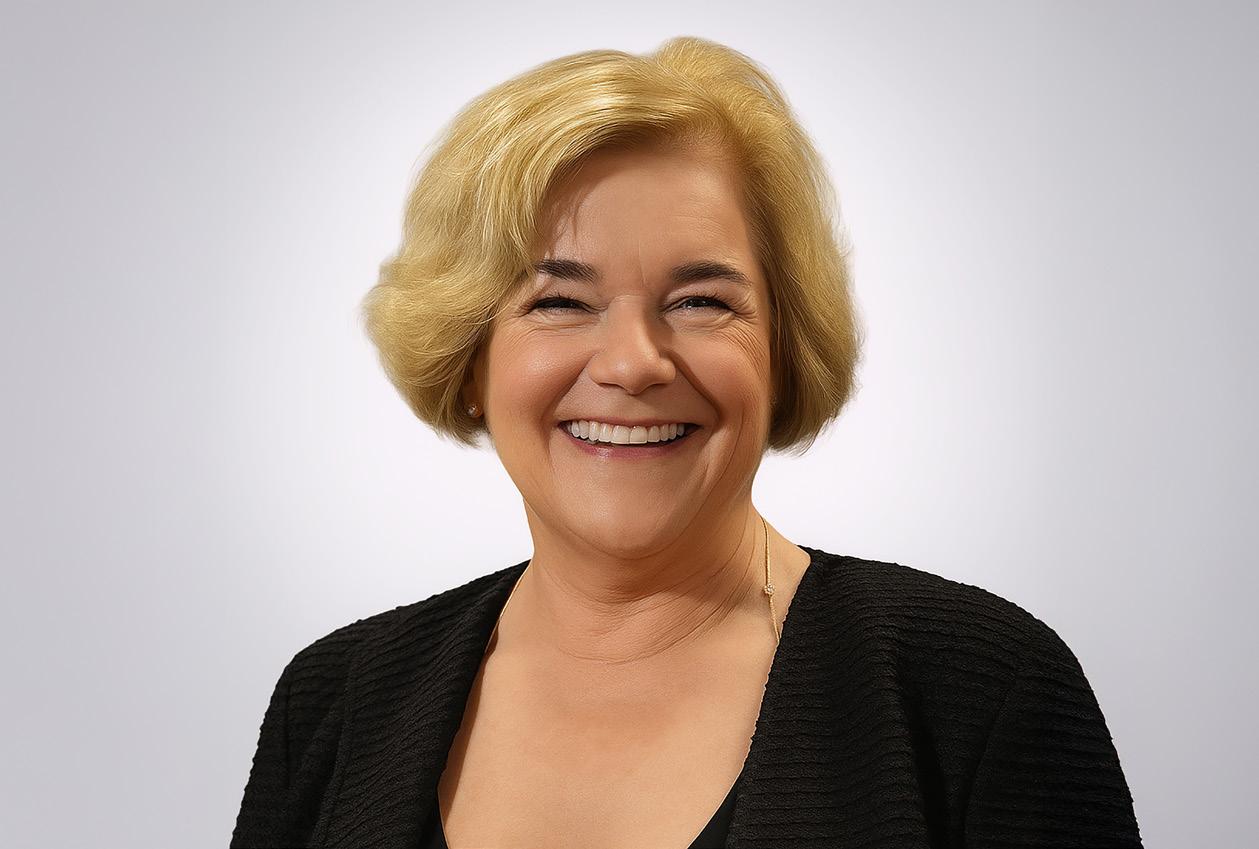
plans to launch a direct-to-consumer platform in 2025 designed to empower individuals and families seeking care — bypassing traditional referral barriers to make diagnostic evaluations and treatment much more accessible.
“It’s terribly concerning to parents who know that there’s something going on with their child, but they can’t get in to see somebody who can tell them what it is,” she told FOCUS magazine. “We believe very much in eliminating the wait. We’ve got to think about how we reimagine care so that we can get people into services when they need them, where they need them, and how they need them.”
The story of Catalight is inseparable from the story of Armiger herself. When she joined its predecessor in 2011, the organization served approximately 500 families. Today, Catalight spans a network of more than 16,000 practitioners, delivering care to thousands of individuals and their families.
As a student at Fielding, Armiger noted that she has found a community that mirrors her belief in systems-level thinking. “The people I’ve met at Fielding — scholars, practitioners, leaders — are doing extraordinary things,” she said. “They’ve helped to shape how I think about change. How I communicate it. How I lead through it.”
It is no surprise that this dynamic changemaker is capturing attention internationally. In 2023, Forbes named Armiger to its “50 Over 50” list in the Impact category. The following year, she was invited to Abu Dhabi for the Forbes 30/50 Summit, an international gathering of women redefining leadership across sectors. This year, the invitation to Davos further expanded her changemaking platform.
In a world awash with change, Armiger offers a clear example of what it means to lead with purpose.
In the architecture of higher education — a world of inquiry, evolving policy, and deliberate transformation — Mike Goldstein helped shape its foundations with both vision and humility. For more than three decades he was a pillar at Fielding Graduate University — a trustee, a mentor, a strategist, and a believer in the institution’s bold mission: that education, thoughtfully pursued, can change lives and the world.
Goldstein passed away on April 26, 2025, after a brief illness. Born and raised in Brooklyn, New York, his early life on East 17th Street, surrounded by a tight-knit extended family and the bustle of neighborhood stickball games, helped shape his lifelong fascination with cities — how they work, and how they can be made to work more justly. That passion became the throughline of a remarkable life in law, education, and public service.
He graduated from Stuyvesant High School, Cornell University, and New York University School of Law before embarking on a career that consistently widened the path for others. Goldstein was the founding director of New York City Urban Corps — the country’s first large-scale student intern program to broaden access for less affluent students through the Federal Work Study Program. Later, with support from the Ford Foundation, he helped scale similar programs nationwide.
Goldstein’s leadership spanned public, nonprofit, and academic institutions, from City Hall to the University of Illinois Chicago, where he served as Associate Vice Chancellor for Urban Affairs and Associate Professor of Urban Sciences. But it was in Washington, D.C., where he arguably made his most enduring mark. In 1978, he established a new legal practice in higher education at the law firm Dow Lohnes. Over the next three decades, that practice became the largest and one of the most
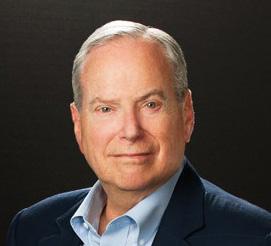
respected in the country, advancing regulatory frameworks that helped make online and distance learning widely accessible. By the time his firm merged with Cooley LLP in 2014, the educational landscape had been forever changed, thanks in no small part to his work behind the scenes. At the time of his passing, he was Managing Director at Tyton Partners, continuing his efforts to shape the future of postsecondary education.
In recognition of Goldstein’s significant contributions at Fielding, the Board of Trustees established the Michael and Jinny Goldstein Endowed Board Scholarship for Dissertation Research Advancing Social Justice, with many trustees giving generously to honor his leadership and legacy. The Goldsteins themselves also gave generously to the endowment, reflecting their shared commitment to supporting Fielding scholars dedicated to advancing equity and justice through their research. As a tribute to the impact that Goldstein had on generations of Fielding faculty and students, he was awarded an honorary doctorate in Humane Letters by the Board of Trustees in 2014.
He also played a pivotal role on the university’s 50th Anniversary Committee, helping to bring Fielding’s celebration to Capitol Hill — a milestone moment that reflected his ability to build bridges between academia and government.
“Mike Goldstein embodied the very best of Fielding — visionary, generous, and deeply committed to social justice,” said Gary Wagenheim, PhD (HOD ’05) and Chair of the Board of Trustees, adding, “His legacy lives on in the students he supported, the values he championed, and the enduring strength of our university. We will miss his wisdom and unwavering belief in the transformative power of education.”
Goldstein’s service extended beyond education. He was a founding board member of The Washington Center, a longtime board director and general counsel for The Washington Ballet, and a dedicated volunteer for the D.C. Fire & EMS Department Rehab Unit for more than 30 years — quietly supporting first responders during crises, including the September 11, 2001 attack on the Pentagon.
He was also honored by numerous organizations, including the U.S. Distance Learning Association Hall of Fame, the Council for Adult and Experiential Learning, and Excelsior College.
And yet, for all his accolades, what many will remember most is the way he gave himself — with generosity, presence, and warmth. He had an infectious smile and a capacious heart, offering his time and counsel generously to colleagues, students, and friends alike.
“Mike brought a rare combination of heart and intellect to everything he touched,” said Fielding President John Bennett, PhD, adding, “He believed deeply in Fielding’s mission and worked tirelessly to advance it because he believed in the power of learning to change lives. His impact will be felt for generations.”
Golstein was, in every sense, an architect of change.
BY CATHERINE RYAN
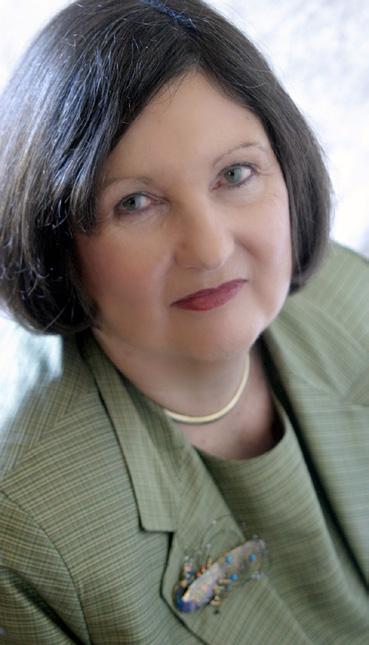
In the long arc of a university’s story, there are leaders who manage, and there are leaders who transform.
Judith L. Kuipers, PhD, who served as president of Fielding Graduate University from 2000 to 2009, was unmistakably the latter. Her passing in October 2024 at age 87 served as a powerful reminder of the indelible legacy she helped forge at Fielding — and of the lasting impact she made on the broader landscape of women’s leadership, educational innovation, and institutional transformation.
For those who worked closely with her, the big-picture accomplishments — of which there were many — are inseparable from the deeply personal presence she brought into every room, every conversation. “Plain and simple, I loved working for and with her,” says Anna DiStefano, EdD, Fielding’s Provost Emerita. “She believed in positive reinforcement. She was truly collaborative. Her style as a supervisor and colleague was direct and clear.” Kuipers’ legacy fits effortlessly within the theme of this issue: Changemakers. It’s not just that she changed the institutions she led — though she did, profoundly. It’s that she did so by believing deeply in people, and in their capacity to grow and to lead. She lived her life as a catalyst for positive change, radiating both conviction and kindness. And her legacy endures through the communities she shaped and the leaders she empowered.
A Michigan native, Kuipers earned her doctorate in human development and early education from Michigan State University. From her earliest academic appointments, her trajectory reflected both exceptional intellect and relentless drive. She first rose through the academic ranks from instructor to professor, then department head, dean, and assistant chancellor. In time, she would become Vice President for Academic Affairs at California State University, Fresno, and later, Dean of Undergraduate Studies at Oregon State University. She also received a prestigious Fulbright Award to examine higher education in the newly unified German states, and she was selected as an American Council on Education Fellow — an honor recognizing her growing national influence.
Her most visible breakthrough came when she was named Chancellor of the University of Wisconsin–La Crosse. She was the first woman at UW-La Crosse to hold that title. It was a role that allowed her to shape everything from infrastructure to innovation during her tenure there from 1991 to 2000, before she transitioned to Fielding.
That same forward-looking spirit defined her time at Fielding. Under her leadership, the university expanded its global reach and raised academic standards, and Kuipers worked tirelessly to grow the institution’s financial foundation. As she put it, her goal was to leave behind “sustainability,” and she meant it in the fullest sense — sustainable programs, people, finances, and vision.
“Judy was truly a remarkable woman who I was lucky to call my boss for eight years, and a friend until her passing,” recalled Shoko Kashiyama, who served Fielding as Executive Assistant to the President and Secretary to the Board of Trustees during Kuiper’s presidency. “She brought a full-hearted joy to her role, as well as to every relationship and interaction she had. She was truly respectful of others’ opinions and perspectives. I loved Judy for her clear sense of self and positive purpose and her startling humanity.”
Reflecting further, Kashiyama added, “There are many words that come to mind in trying to capture Judy’s person and spirit: empathy, commitment, drive, discipline, dignity, leadership, warmth, fun, caring, resilience. As a woman of a certain generation from a working class family who came up through the ranks in higher education leadership, mostly in the state university systems, she had many experiences of being dismissed or discriminated against. Rather than being bitter, however, they made Judy more focused, clear, and committed to Fielding’s mission of providing equal access to opportunities through graduate education for everyone.”
Kuipers was also known for her grace and flair. “She had a sense of her own personal style — colorful, feminine, professional,” noted DiStefano. Style, for Kuipers, wasn’t about vanity — it was about intention. Whether she was raising endowment funds or launching new academic programs, she operated with clarity and cohesion. She built teams with care. She moved institutions forward without losing sight of people. For her, higher education was inseparable from public service.
Looking back, what made Judith Kuipers a changemaker was her ability to implement sweeping change and her unshakeable belief that transformation is not only possible — it is essential. She believed it for institutions, and she believed it for individuals. And she didn’t just believe in change. She led it, modeled it, and inspired it.
Through every policy, every program, and every gesture, she left a message for all who follow in her path: Lead with courage, live with care, and never underestimate the power of a kind word — or a brightly colored scarf.
She was, in every sense, a changemaker.
Fielding is grateful for the generous support of the following individuals who made contributions or pledges between April 18, 2024 and June 25, 2025. Their support helps fuel the success of our students and the future of Fielding. To make a gift or to request an update, please contact giving@fielding.edu.
Dorothy & Niels Agger-Gupta
Kymberly Akouris
Pauline Albert
Michael Ali
Mary Estelle Amberg
Leslie & Edward Atler
Richard Beaver
Ginette Bedsaul
Autumn Bell
John L. Bennett & Eric T. Johnson
Valerie Malhotra Bentz
Joan & Eldon Boes
Karen & Zachary Bogart
Steven Bond
Alma Boutin-Martinez & Paul Boutin
Judith Boykin-Mccarthy
Dwayne Brown
Deborah Bucci
Meike Buegler
Karin A. Bunnell & MB Bettencourt
Janet & Joseph Bush
Don Bushnell Living Trust
Tony D. Byers
Joann Canales
Michael Carlisle
Alton C. Carswell & Dominik Venezzetti
Stephen Chiang
Juan Christian
John Crum
Allison Davis-White Eyes
James Day & Darra Prather-Day
Alison Denton
Elsa & Daniel Distelhorst
Peter Donnelly
Caroline Dott
Keith Earley
Dino M. Ferrare
Tiffany Field
Tracy Fisher
Amy Fisher
Linda & Gary Ford
Luann Fortune
Tracy Frederick Corcoran
Krista Freece
Cynthia & Joel Freeman
Janet Garufis
Christine Garvey
Kathy D. Geller
Tracy C. Gibbons
Susan Goldberg
Jinny & Michael* Goldstein
Mark Gould
Anthony F. Greene
Marc Hanlan
Mary & Charles Hanzel
Julie & James Harding
Anne Hatcher Berenberg
Nancy Haugen
Sharon Hawley-Crum
Stephen Haymes
Karl F. Hebenstreit
Joyce & Lenneal Henderson
Mary Henderson
Seymour Hersh
Sue Hess
Patricia & John Hodges
Linda Honold
Bill Huffaker & Darin Severns
Marsha Hughes-Rease
Kae & Phil Hutchison
Anzi Jacobs
Tanya Jones
Kerul L. Kassel
J Gwen Kennedy
Michael Klein
Kay Knox
Zieva & Marc Konvisser
Diana Kunkel & Trish Cleary
Berit Lakey
Judy Lee
Tracy Lefebvre
Debra Lemke
Tony LeTrent-Jones & Alfred E. Jones
Tracy N. Long
Bryan & Rhonda Lopes
Lynn D.W. Luckow
Katherine E. Welch Lui & John W. Lui
Sarah N. MacDougall
Heather Mahardy
Elizabeth Mangini
Nancy Markle
Louis Marucci
Barbara & Robert Mather
Charles McClintock & Carol Wilburn
Sara Miller McCune
Katherine McGraw
Pat McKeldin & Gorman Ortiz
Pamela McLean
Kathleen McNulty
Suzan McVicker
Natasha Miller-Zahn & Kristen Miller
Weston Milliken
Alison & Richard Mitchell
Montecito Bank & Trust
Elisabeth Montgomery
Donald Mroz & Susan Lapine
Garry Murdock
Mary Nicholas & Eugene Eliasoph
Elena I. Nicklasson
Courtney & Scott Norris
Dianne & Carl Oliver
Alayne Ormerod
Beverly & Dan Palley
Kristin O. Palmer
Thavivanh Phosavath
Ellen Porter Honnet
Christie Prairie Chicken
Marilyn Price-Mitchell
Carmen Pulido
RAC Leadership
Rebecca Reese
Margery Regalado-Rodriguez & Frank Rodriguez
Nicole Retland
Leesa M. Riviere
Katrina S. Rogers
Barry Rubin
Jennifer Ruff
Nicole S. Scales Lindberg
Arnold Schaffer
Christina Schowe
Nancie Senet
Harold Shabo
Constance & Jay Shafran
Nancy & Ira Shapiro
Juliann Smendzuik-O’Brien
Greta Smith Garcia & Garrick J. Garcia
Charles Reid Spearman
Mark Sperber
Jeanne Sterling
Judith Stevens-Long & Laurence Severance
Janette Stringer
Anna Szabados
Tonya Tate
Jimena Terell
Randal Thompson
Marshella & Ivory Toldson
Sergej Van Middendorp
Connie Veazey
Mary Jean & Mark Vignone
Lisa Vogelman
Harry M. Voulgarakis
Gary Wagenheim
Nancy Weisman
T’airra Whitis
Marjorie J. Woo & Robert T. Juarez
Patricia Zell & Michael Cox
Thank you to those who have included Fielding in their wills or made other planned gifts to help secure Fielding’s future.
Anonymous
Pauline Albert
Natalie Ammarell
Peggy Azad
Nancy Baker
John L. Bennett
Valerie Malhotra Bentz
Dorothy Billington*
Linda & Marvin
Branch
Lynn Bursten
Don D. Bushnell*
Christine Clark
Kelly Clark
Anna DiStefano
D’Ann Downey
Nanine Ewing*
Melody Fortenberry
Jeff Frakes
Leola Furman
Kathy D. Geller
Tracy C. Gibbons
John H. Gladfelter*
Jinny & Michael* Goldstein*
Sharon Hawley-Crum
Linda Honold
Roberta Jensen
Anne Kratz
Diana Kunkel & Trish Cleary
Sarah N. MacDougall
Paige & Don Marrs
Barbara A. Mather
Charles McClintock & Carol Wilburn
Sara Miller McCune
Pamela S. Meyer
Eileen Morgan
Donald Mroz & Susan Lapine
Fielding Graduate University’s Founders’ Circle recognizes visionaries who include Fielding in their long-term giving plans. As a Founders’ Circle member, you help ensure that future generations of scholar-practitioners will continue to lead with purpose, equity, and integrity.
• A complimentary Fielding publication each year to stay informed and inspired
• Insider updates directly from the University Leadership Team
Christi Olson
Wendy Overend
Marilyn Price-Mitchell
Kathleen Randolph
Katrina S. Rogers
Rochelle Santopoalo
Nancy & Paul Shaw
Andrea Shields
Judith Silverstein
James Skibo*
Nicola Smith
Carol Sommerfield
Ted J. Takamura
Charlotte & Roland*
Troike
Pamela Van Dyke
Marjorie J. Woo
Patricia Zell
*Deceased
“In honor of Mary Hanzel.”
—Pat Hodges
“Congratulations to all Fielding students!!”
—Kathleen McNulty
“In honor of Eleanor Blumenberg’s birthday on December 7, 2024.”
—Harold Shabo
“In honor of Dr. Katrina Rogers.”
—Marjorie J. Woo
“Thank you for directing me to Fielding.”
—Mary Estelle Amberg
“In honor of Debra Bendell-Estroff and in memory of Stephen Ruffins.”
—Harry M. Voulgarakis
“In honor of my parents Jack and Harriett Savage, and in memory of Lila ‘Peggy’ Azad, a Fielding alumna and dear friend who passed away April 17, 2024.”
—Sharon Hawley-Crum
“In memory of Paul who passed away November 15, 2024. He was in my ACW in 1982.”
—Sharon Hawley-Crum
Shape the future, on your terms.
A planned gift to Fielding offers you the unique opportunity to support causes you care about — while maintaining flexibility and control during your lifetime.
With a planned gift, you can:
• Retain full control of your assets while you need them
• Modify your gift at any time if your circumstances or intentions change
• Choose your method of giving, such as a fixed dollar amount, a percentage of your estate, or a specific asset
Every planned gift, large or small, helps shape Fielding’s future and empowers students who are changing the world.
• Invitations to exclusive gatherings — both virtual and in-person — celebrating your impact
• Special recognition opportunities in university communications and events
To learn more about the Founders’ Circle or how a planned gift might best reflect your values, contact: Elena Nicklasson | Vice President of University Relations 805.898.2926 | giving@fielding.edu
DOCTORAL DEGREES
EdD, Leadership for Change
PhD, Human Development
PhD, Organizational Development & Change
Concentrations
Coaching
Community College Leadership for Change
Creative Longevity & Wisdom
Dual Language
Inclusive Leadership for Social Justice
Leadership of Higher Education Systems
Media, Technology & Innovation
Organizational Development
Somatics, Phenomenology & Communicative Leadership
Sustainability Leadership
MASTER’S DEGREE
MA, Organization Development & Leadership
CERTIFICATE
Evidence Based Coaching
DOCTORAL DEGREES
PhD, Applied Psychological Science
PhD, Clinical Psychology
Concentrations
Forensic Psychology
Health Psychology
Neuropsychology
Social Justice & Diversity
PhD, Infant and Early Childhood Development
Concentrations
Developmental, Individual Differences, Relationships (DIR®)
Reflective Practice & Supervision
PhD, Media & Technology
Concentrations
Positive Psychology & Media
Psychology & Audience Engagement
Social Media Research
MASTER’S DEGREE
MA, Applied Media Psychology
MA, Infant, Child, & Family Mental Health & Development
CERTIFICATES
Clinical Psychology, Postbaccalaureate
Media Psychology (with optional emphases in Media Neuroscience or Brand Psychology & Audience Engagement)
Neuropsychology Specialization Training Program
Respecialization in Clinical Psychology, Postdoctoral
The Institute for Social Innovation helps individuals, nonprofits, businesses, and government organizations create effective, efficient, sustainable, and just solutions to social problems via research, leadership, and organizational development.
The Marie Fielder Center for Democracy, Leadership, and Education is a multidisciplinary research and advocacy center aimed at advancing diversity and inclusion throughout society.
The Alonso Center for Psychodynamic Studies aims to expand the application of psychodynamic ideas, treatments, and principles both within the Fielding community and the larger society.
NOVEMBER 1, 2024 – MAY 31, 2025
SCHOOL OF LEADERSHIP STUDIES
CERTIFICATE IN EVIDENCE BASED COACHING
Mashaal Ahmed
Kellie Hernandez
Cloe Mai Le Gall-Scoville
Ruth Caskie Lewis-Clapper
Joshua Mains
Hanna Song Melcher
Beatrice Oluwanishola Onwuka
Aaron Eugene Seldon
Horatiu Gratian Stefan
Monique Antoinette Stennis
Wanda Wang
MASTER OF ARTS IN ORGANIZATION DEVELOPMENT AND LEADERSHIP
William Cameron Carrick
Chizarra Lateefah Dashiell
Elisa Adriana Hendricks
Elizabeth Ann Levison
George Gosling Nachtrieb
Meghan Collin Gerzon Rand
Melissa Walker
Vanessa Wyant
SCHOOL OF PSYCHOLOGY
MASTER OF ARTS IN APPLIED MEDIA PSYCHOLOGY
Nadia Almaleh
Anna Isabel de Luna Asesor
Jessica Bargilione
Joshua Ezequiel Castellanos
Casey Lynn Covel
Tamer Ezzat
Lacey Farrow
Agatha Gwokyalya
Alison Lee Hill
Tahera-Rafia Matamoros-Kassam
Margot Rebecca Nockowitz
Jamie Pavek
Laron Calvin Smith
Kaylin Renee Staten
Andrea Thrasher Steves
Brenna Uimari
MASTER OF ARTS IN INFANT & EARLY CHILDHOOD DEVELOPMENT WITH AN EMPHASIS IN MENTAL HEALTH & DEVELOPMENTAL DISORDERS
Aster Berhane
Giselle Adlawan Butalid
Paige Elizabeth Elliott
Kaitlyn Elizabeth Howell
Sophie Marilyn Hughes
Nagwa Khedr
Megan Michelle McQuinn
Taylor Renee Pope
Tatiana Shibata
Kayla Young
Sabrina Lee Young
POSTBACCALAUREATE CERTIFICATE IN CLINICAL PSYCHOLOGY
Katherine Melissa Ainslie-Wallace
Joyce Berhold
Margaret Anne Blatt
Sierra Dawn Bradeen
Kiarra Shanté Cade
Savannah Faircloth
Theresa Ferri
Adeel George
Belisa Fa’sha Kershaw
Joshua Jeffery Kulp
Rickki Ann Martinez
Shawni Mitchell
Morgana Hypatia Moss
Amanda Rodriguez
Mania Sarian Ghalemaleki
Megan West
Muriel Williams
POSTDOCTORAL CERTIFICATE OF RESPECIALIZATION IN CLINICAL PSYCHOLOGY
D’Arcy S. King
NOVEMBER 1, 2024 – MAY 31, 2025
DOCTOR OF EDUCATION WITH AN EMPHASIS IN LEADERSHIP FOR CHANGE
Andrew Edmunds
Decolonizing Compassion: Worldview, Empathy, and Burnout in Direct Care Work
Paul Freedman
Holistic Leaders, Holistic Schools: Portraits of Exemplary K-12 School Leaders
Frank Tyler Gidney
Democratizing Service Learning: A Critical, Transformative Approach to Service Learning and Civic Literacy at CSU Monterey Bay
Valerie D. Johnson
Instructor Bias Toward Students of Color in Special Education As Witnessed by School Social Workers
Kailina Mills
Liberatory Education in Early Childhood: The Reggio Emilia Approach, Culturally Inclusive Teaching, and Nature-Based Learning
Zuopin Qin
Comparison of Family Education Systems in China and the United States: Impact of Concepts and Methods of Parental Involvement in China’s Elementary Education
Alicia Scott
Marva Collins: How One Teacher Ignited the Innate Brilliance of a Generation of Black Children
Maxine Sloan
Using the Navajo Concept of Taa’ho Ajit’eego Teiya Ya’at’eehgo Ji Nahleh (Your Success in Life Is Your Personal Responsibility) in the Design of a Financial Literacy Curriculum for Fourth Grade Students
DOCTOR OF PHILOSOPHY IN HUMAN DEVELOPMENT
Candace C. Cabbil
“It Runs in the Family”: A Multigenerational Exploration of Black American Women and Cultural Trauma
Denise Dziwak
Learning to Flourish: A Feminist Existential Model for Women Leaders in Corporate Latin America
Carol Lee Estrada
The Abbreviated Life Study
Aundriea Janiece Evans
The Fathering Experiences of Previously Incarcerated Black Men
Sarah Baite Kitonsa
A Study Into the Career and Socioeconomic Integration Experiences of Highly Skilled Immigrant Women From East Africa to the United States
Michele LaFleur Leaver
Exploring Strategic Relationship-Building Among Successful High-Growth Entrepreneurs
Casandra D. Lindell
Shamans and Bunnies: Painting Through Layered Bereavement to Discover Inner Wisdom
Robert Laurence McLaughlin
The Impact of a Residential Multicultural Program on Students’ Life Direction
Iris Nafshi
Beyond Grit and Guilt: Uncovering the Psychological Resources Fueling Ironmoms in Ironman Training and Racing
Amrita Venkata Subramanian
Explorations of the Lived Experience During COVID-19: A Phenomenological Inquiry Into Possibilities of Posttraumatic Growth
Natalie Vishnevsky
Quantum in Business Leadership: Shaping Organizational Environments and Success
DOCTOR OF PHILOSOPHY IN HUMAN & ORGANIZATIONAL SYSTEMS
Kabo Yang
DOCTOR OF PHILOSOPHY IN ORGANIZATIONAL DEVELOPMENT & CHANGE
Derrick G. Anthony
The United States Intelligence Community: Interpretative Phenomenological Analysis of the African American Perspective
Desiree Dawn Briel Rodi
The Implementation and Integration of Social and Emotional Learning in Elementary Schools: Educator Experiences. A Local Study of a Seattle-Area School District
Dwayne Kamal Brown
Rethinking Banking Access: Barriers, Trust, and the Financial Lives of the Unbanked
Alice Campbell
A Mentor’s Compass: Professional Networks in the United States Navy Reserve
Kelly Capra
Immunity to Change in the Context of Coaching
Michael A. Gavin
Evaluating Technology Insertion Strategies in Complex Organizations
Melissa Ann George
Navigating Ambiguity in Leadership Transformation: Insights From International School Leaders
Stacy Giffin
Leveraging Reflexivity in Project Teams: Intentional Approaches to Improve Teamwork and Outcomes
Jorge Gutierrez
The Role of Adaptive Leadership in a Family-Owned Small Business: An Action Research Case Study
Greg Falcon Hardt
A Qualitative Exploration of Interpersonal Dyadic Trust Between Subordinates and Their Supervisors in the Workplace
Shelli Renee Hendricks
What Leaders Have Learned About Themselves and Their Leadership Experiences During the COVID-19 Pandemic
Deborah Jackson
Person-Centered Planning — Exploring Successful Outcomes
Pamela Knight Mattsson
Understanding the Cultural Challenges of Privately Held Unicorn Startups
Cynthia Louise Wilson
How Do Members of the Community of African Americans in the Private Capital Industry Describe Opportunities, Barriers, and Success?
Lin Yuan
Navigating Social-Commercial Tensions: A Case Study of Framing and Communication in a Chinese Nongovernmental Organization
Michelle Renee Zeiser
Understanding the Experiences of Women Leaders in Technology Organizations
DOCTOR OF PHILOSOPHY IN INFANT & EARLY CHILDHOOD DEVELOPMENT WITH AN EMPHASIS IN MENTAL HEALTH & DEVELOPMENTAL DISORDERS
Tiffani Renee Billings
Nurturing Early Childhood Educators: Understanding Teacher Social-Emotional Competence
Jennifer Breslin
Trauma and Mental Health Outcomes in Former Child Actors
Marion Alene Clough
Lived Experiences of Caregivers With a Visually Impaired Child: A Phenomenological Study
Susan Jill Fergus
Exploring Educators’ Perceptions of Challenging Behaviors When Using a Developmental Approach
Aretha Hampton
An Exploration of Physician Engagement with Fathers and Non-Birthing Parents: Physician’s Meaning Making of Father Inclusive Practices
Melinda Ledlow
Exploring Minority Stress, Confidence in Advocacy, and Community Connectedness in Parents of Autistic Gender-Expansive Youth
Fagie Mandel
A Model for Changing the Standard of Dyslexia Response From Wait-to-Fail to Proactive Care: The Role of Pediatricians in Early Identification and Intervention
Latoya Miles
Relationship Among Parenting Styles, Socioeconomic Status, and Emotion Regulation in Children Ages 6 to 9
Colette Ann Ryan
The Effectiveness of DIRFloortime® Supporting Parental Self-Efficacy in a Japanese Mother of a Child With Autism Spectrum Disorder
Kamelia Rouhani Slankard
The Parental Perspective of the Familial Effects of Childhood Apraxia of Speech
Charmaine Chungchhin Tidmarsh
An Exploratory Study on the Effects of the Infant Cuddling Program on Prenatally Exposed and Institutionalized Infants in Hong Kong
Danielle Anne Tschirhart
Understanding Early Emotional Regulation as a Potential Predictor of Pediatric Anxiety
Autumn Lynnise Banks
Food, Faith, and Femininity: Exploring the Associations Between Religious Motivation, Gender Roles, Purity Culture, and Eating Disorder Symptoms
Oyejoke Omolola Coker
Gratitude’s Relationship with Job Satisfaction, Employee Commitment, Organizational Citizenship Behavior and General Affect in the Workplace
Isabel Kenner
Closer Relationships, Higher Investment: Experimental Evidence of Relational Sunk-Cost Bias
DOCTOR OF PHILOSOPHY IN PSYCHOLOGY WITH AN EMPHASIS IN APPLIED PSYCHOLOGICAL SCIENCE
Stanley E. Kletkewicz, Jr.
Unacknowledged Abuse Experiences: An Overlooked Phenomenon Affecting Psychopathology, Wellness, and Relationships in and Out of the Psychotherapist’s Office
Chi Wai Ronald Lam
Predictors of Help-Seeking Intentions Among Mainland Chinese and Hong Kong Chinese Students in America
Collin Addonice Weekes
Religious Salience and Its Relationship to MMPI-3 Scales Among Christian Leaders: The Insensitivity and Robustness of the MMPI-3 Scales to Religiosity
DOCTOR OF PHILOSOPHY IN PSYCHOLOGY WITH AN EMPHASIS IN CLINICAL PSYCHOLOGY
Natalie Jan Bloodworth
Mindfulness-Based Interventions in Minority Youth with Attention Deficit Hyperactivity Disorder
Eugene Joseph Boyle
Investigating the Utility of the Comprehensive Trail Making Test - Second Edition (CTMT-2) in Assessing Attentional Deficits Among Children and Adolescents
Alejandrina Garcia
Broad Cognitive Abilities and Childhood Aggression: A Longitudinal Study
Shannon Lynn Harper
Acceptance and Commitment Therapy for Stress
Reduction in Caregivers of Children With Autism Spectrum Disorder: A Feasibility Study
Mary Ireland
Self-Interrupted: Exploring the Relationships Among Attachment Insecurity Severity of Disordered Eating Patterns in Women, Interpersonal Disappointment, and the Role of Identity Diffusion
Leo Kiralla
Recognition and the Embedded Self: Rhythmicity, Responsibility, and Paradox in Adult Monozygotic Twins
Annie Luu
Exploring Compassion Fatigue, Compassion Satisfaction, and Moral Injury Among Law Enforcement Officers: A Survey
Caitlin Martin
Predictive Power of Intra-Individual Variability Across Neuropsychological Disorders
Marilyn Teresa McCune
Do Postnatal Maternal Depressive Symptoms and Cortisol Predict Cognitive Performance in 3- and 5-Month-Old Infants?
Shantay Mines
Afrocentrism Effects on Combat-Related PTSD Symptoms for Black Iraq and Afghanistan Male Combat Veterans
Patricia Mojdara
A Quantitative Examination of Two Equine Therapy Models on Veterans With Mental Health Needs
Kary Mueller-Schansberg
The Effect of Energy Drink Consumption on Adolescent Aggressive Behavior: Does Gender or BMI Play a Role?
Ashley Nicole Roth
The Wounded Healer in Practice: A Mixed Methods Study Exploring the Moderating Relationship Between Trauma Therapists’ Childhood Trauma, Sense of Coherence, and Impacts on the Positive and Negative Experience of the Work
Samantha M. Silverberg
Perceptions of Play Among New Mothers With Serious Mental Illness
Angela Solimo
Violence Risk Assessment Among Seriously Mentally Ill Patients in the Clinical Alternative to Punitive Segregation Program in the New York City Jail System
Rachel Elizabeth Steele
“Boys Will Be Boys”: Gender Microaggressions, Coping Styles, Identity, and Psychological Well-Being Among Military Spouses
DOCTOR OF PHILOSOPHY IN PSYCHOLOGY WITH AN EMPHASIS IN MEDIA AND TECHNOLOGY
Joshua D. Cohen
Development and Validation of a Repeat Watching Behavior and Motivations Scale
Anita Louise Crawford Clark
A Representation in Transition? Social Representations of Masculinity in Male Reactions to Gillette’s #TheBestMenCanBe Commercial
Cory Alexandria Logston
The Effects of Historical Empathy and Transformative Learning on Implicit Bias in a Virtual Reality Experience
Damon Eugene Watkins, Jr.
Educational Psychology and Technology: Use of Mouse Pointer Toggles in Teaching Electronic Health Records

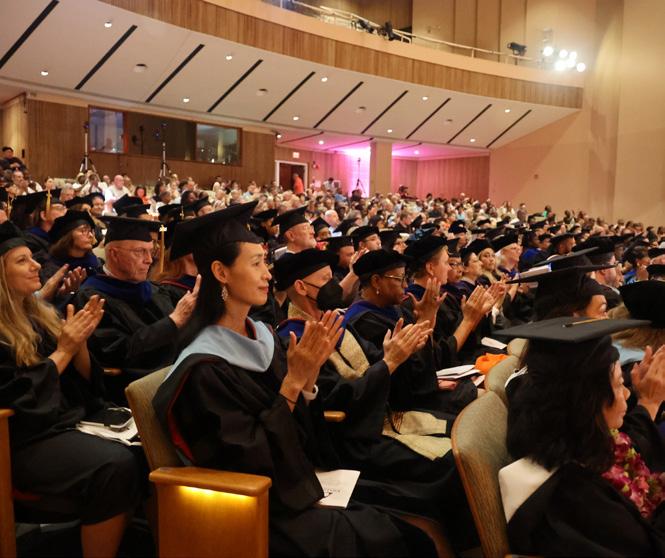


A changemaker’s journey thrives with community involvement and support. We invite you to join the Fielding Alumni Association — our dynamic community of more than 6,000 alumni worldwide who are helping transform the world through leadership, innovation, and social impact.
Membership in the Fielding Alumni Association brings you tremendous opportunities to grow, connect, and thrive with your peers. Enjoy lifetime membership benefits that open doors to exclusive resources: access to the alumni directory, a robust alumni library, a complimentary Pro Zoom account, and more. Alumni, students, and faculty are all welcome!
Join us in charting the future — visit alumni.fielding.edu today.
Ready to show your Fielding pride? Order your Fielding merchandise here: www.fielding.edu/store
We invite you to share your accomplishments here: www.fielding.edu/news/share-your-accomplishments
Questions? Reach out to alumnirelations@fielding.edu


alumni.fielding.edu